SEPTEMBER 2024

NZ MASTERS CLUB TEAM CHAMPS IN WHANGANUI
2024 SECONDARY SCHOOLS
TRANS-TASMAN
REFEREE JANET UDY IN THE HOT SEAT

SEPTEMBER 2024

NZ MASTERS CLUB TEAM CHAMPS IN WHANGANUI
2024 SECONDARY SCHOOLS
TRANS-TASMAN
REFEREE JANET UDY IN THE HOT SEAT

Independent research by leading consumer magazine Reader’s Digest found G.J. Gardner Homes to be New Zealand’s Most Trusted Home Builder once again.
Talk to us today and see why more New Zealanders trust G.J. Gardner to build their homes year after year.
0800 42 45 46 / gjgardner.co.nz




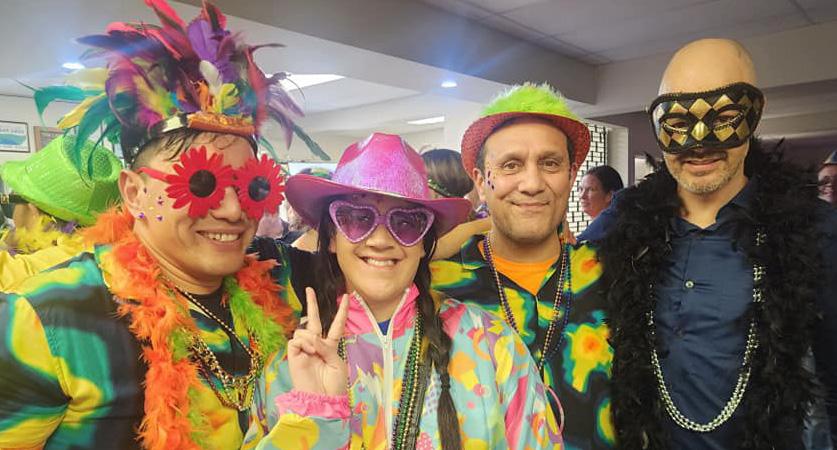
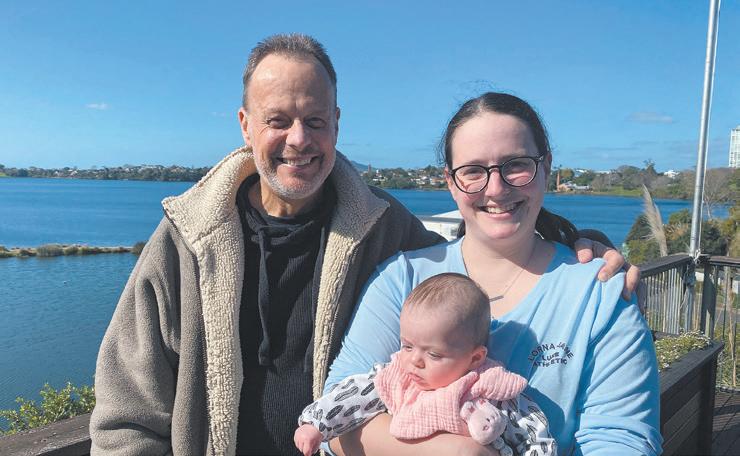
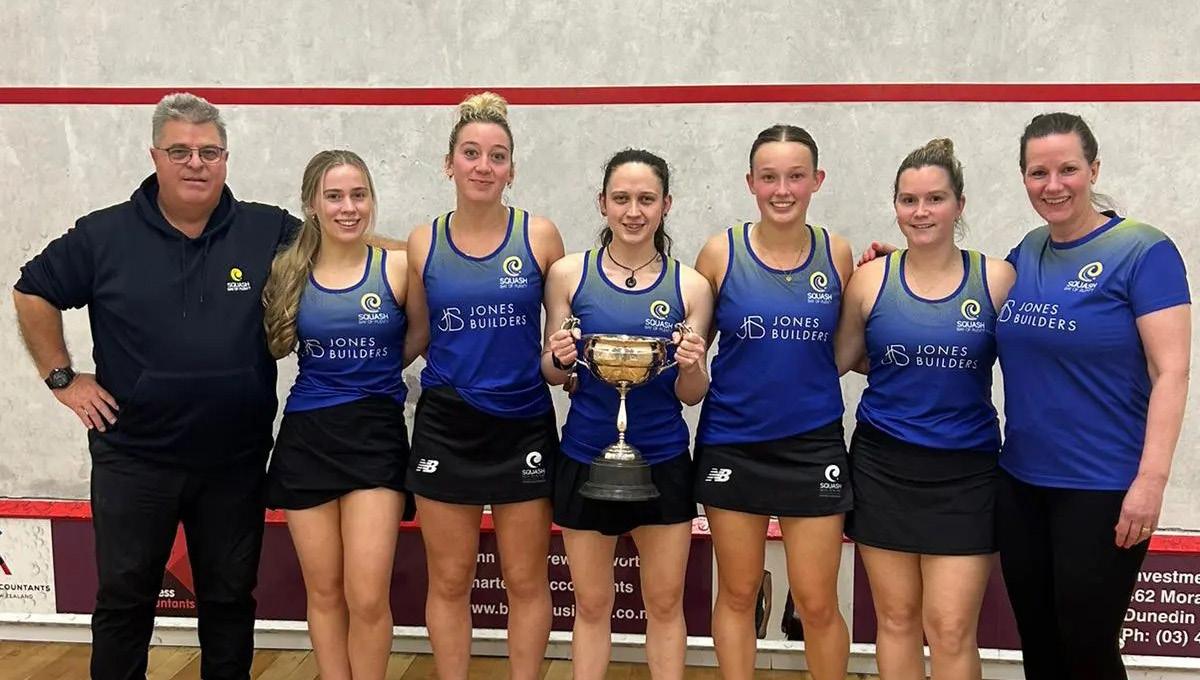
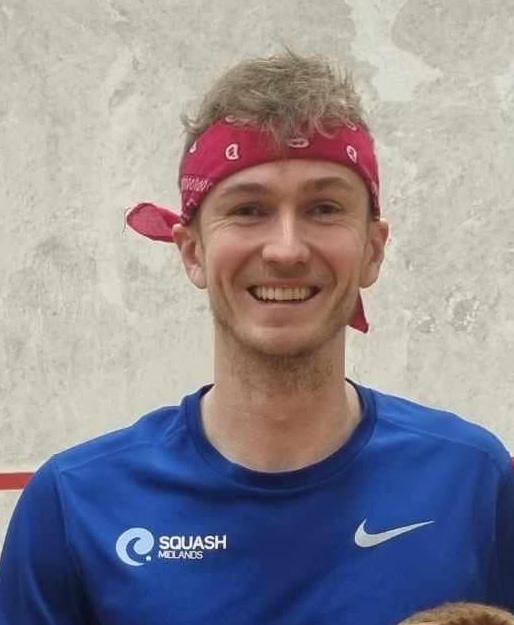
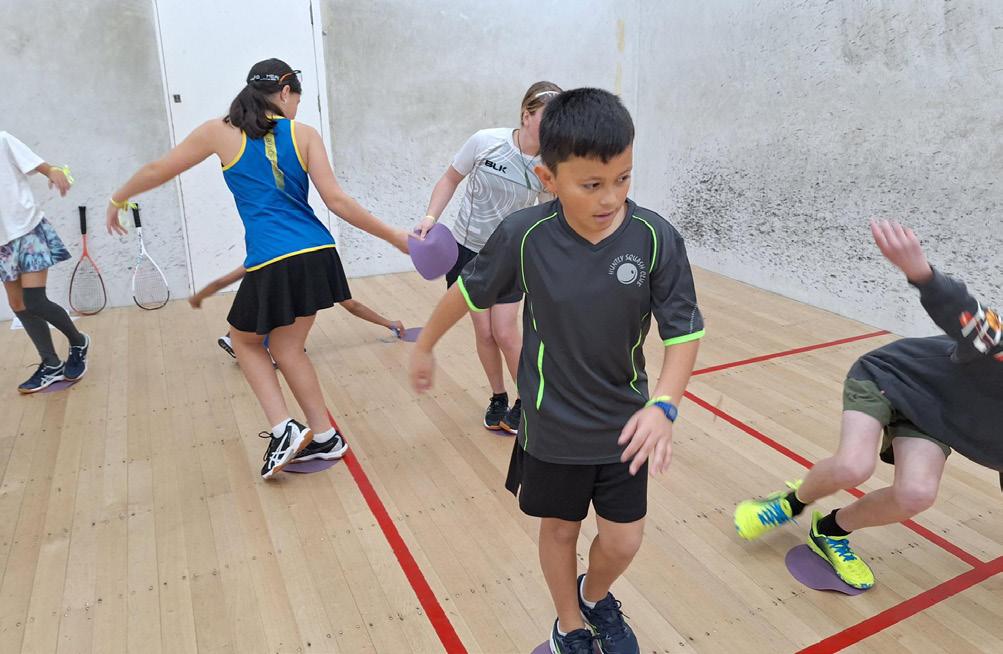
Tēnā koutou
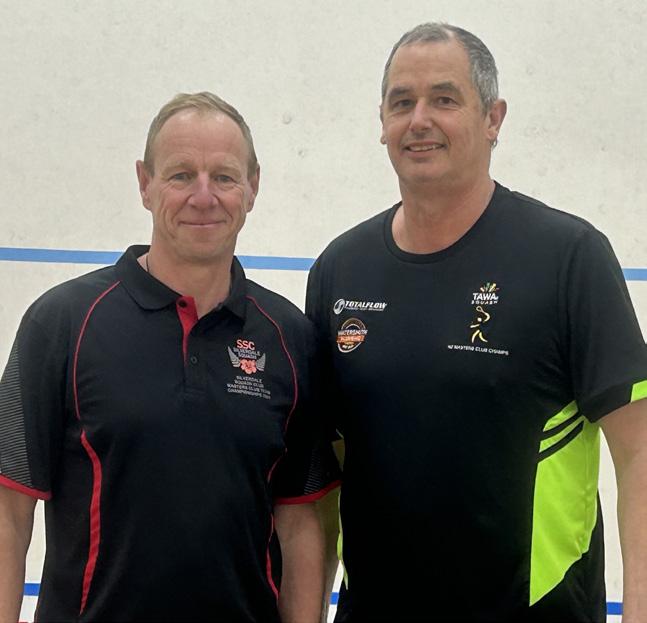
Recently, I had the pleasure of participating alongside 194 other players in the Masters Club Championships in Whanganui. The energy both on and off the court was truly inspiring, and it’s clear that this event has become an annual highlight for many. I’m already hearing teams making plans for next year!
A personal highlight for me was playing against former world number 3, Stuart Davenport (read about Stuart here). Although he may have lost some of his former speed, as we all do when we hit masters, his class was unmistakable, and he quickly reminded me of my place as a keen but recreational player! Looking ahead, with just five months until the full release of MySquash, my colleague John Fletcher and I will soon embark on our national roadshow. Our
Event
Southland Junior Open
Midlands Junior Open
September - National Superchamps
B grade C grade
D grad E grade
F/J grade
G.J. Gardner Homes NZ Junior Age Group Champs
NZ Junior District Team Championships
G.J. Gardner Homes NZ Masters Championships
NZ Inter-District Masters Team Championships
aim is to connect face-to-face with representatives from over 80% of our affiliated clubs, as their involvement is crucial. After nearly three years of dedicated effort to develop a bespoke platform that enhances the member experience and supports clubs, we are excited to roll out the full version in January 2025.
The roadshow will take us to 15 different centres, from Invercargill to Whangārei and Greymouth to Napier. The best part? Driving through and experiencing our beautiful country along the way!
Ngā mihi Martin Dowson
Don’t miss any upcoming events. Click HERE to access the full tournament calendar
13th - 14th September
14th - 15th September
17th - 21st September
Riverton Squash Club
Timaru Squash Club
Whangarei Squash Club
Hamilton Squash and Tennis
Methven Squash Club
Kawaroa Park Squash Club
Squash City Invercargill
4th - 6th October
7th - 8th October
18th - 20th October
21st - 22nd October
North Shore Squash Club
North Shore Squash Club
Tawa & Manā Squash Clubs
Tawa & Manā Squash Clubs

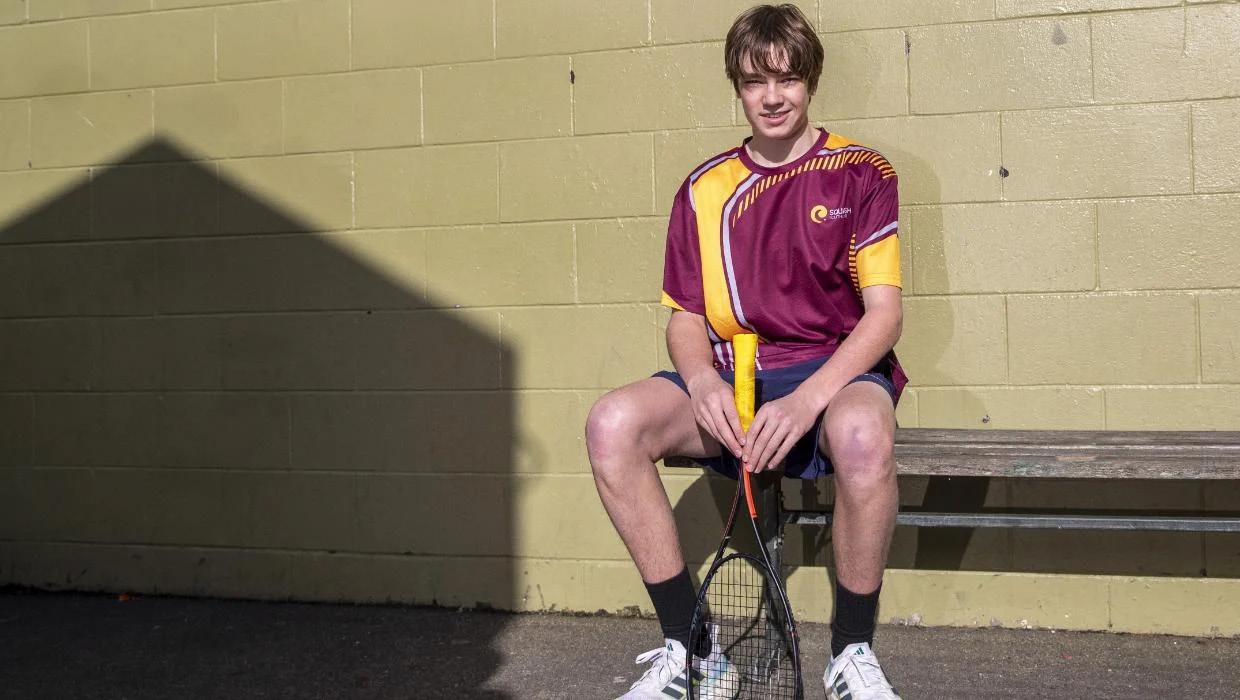
Squash City Invercargill player collects South Island title
Southland Boys’ High School squash player Thomas Gray, 16, won the under-17 grade at the recent South Island Age Group Championships in Dunedin.
Read the full article HERE on Stuff’s news site
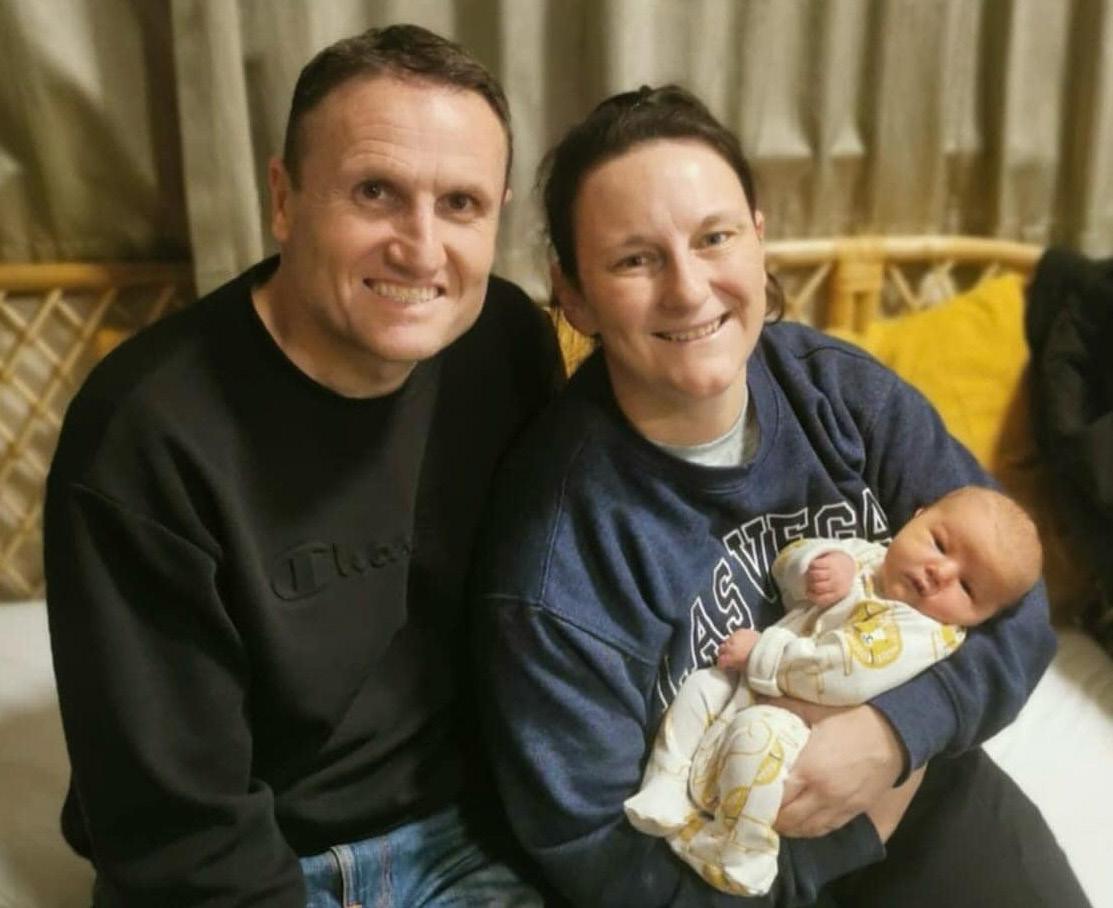
Congratulations Nicki Blake (General Manager of Squash Waikato) and her partner Russ on the arrival of your baby boy Cooper Gavin Boot. We wish you all the best!
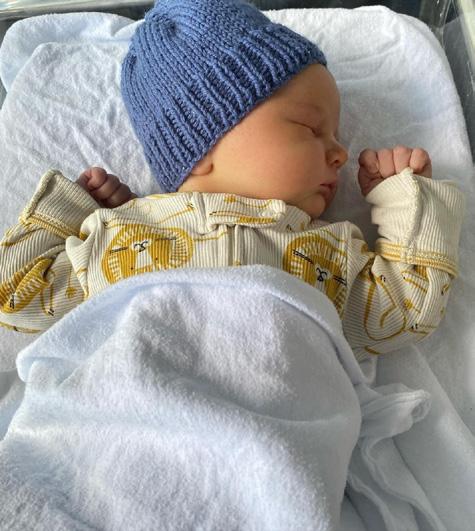
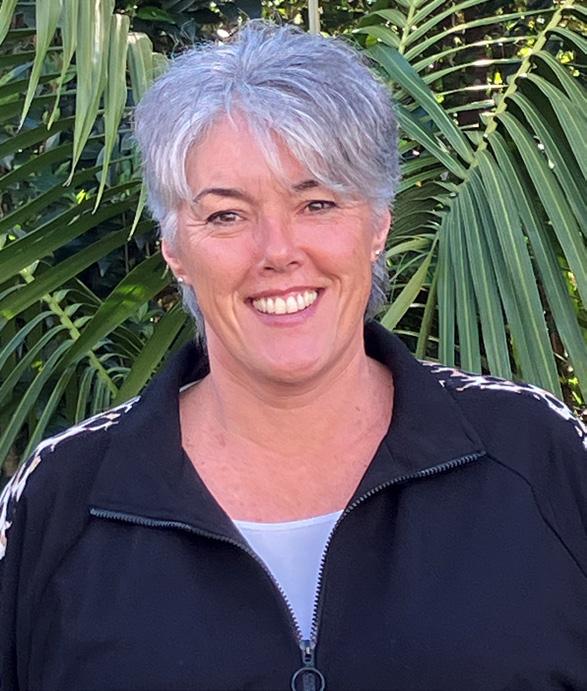
We’re thrilled to welcome Fleur Townsend back to the SNZ family as our new Administrative and Finance Manager! With her wealth of experience and passion for squash, Fleur is the perfect fit to lead our accounts, support MySquash, and take charge as our office manager. Having represented New Zealand in squash in the late 1980s, Fleur brings not only her expertise but also a deep connection to our sport. We’re incredibly fortunate to have her on board, and we can’t wait to see the amazing contributions she’ll make!
At the recent NZSS Squash Teams Championships, Manu was presented the School Sport New Zealand Service to Sport Award. This award is presented to only 4 or 5 recipients each year from all over the motu from all the different sports played at Secondary Schools. Manu has been heavily involved in the development of secondary schools players, first with Westlake Boys High School, then recently with Takapuna Grammar. He has also completed the “Double Double” in 2024 winning championships with both Boys and Girls teams, and with different schools. Manu has been a coach of the NZ Secondary Schools Squash Team along with coaching many other players from other schools.
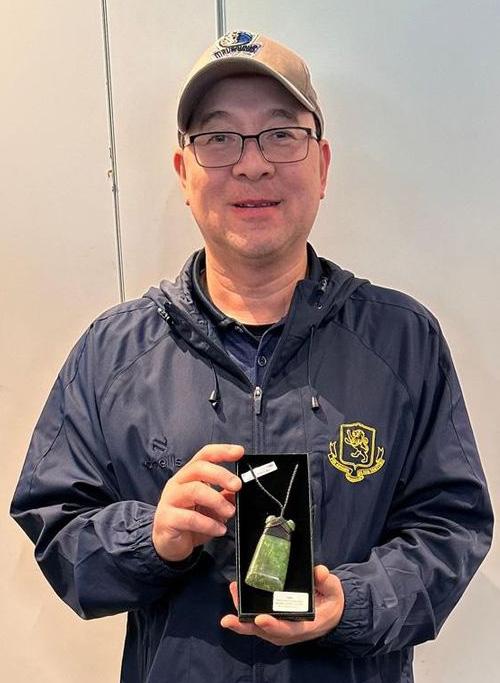
Mike Summerell, CEO of School Sport NZ says “On behalf of the School Sport NZ community, we thank you for the countless hours you have dedicated to nurturing young athletes and promoting the values of school sport. We are honoured to present you with this award, a small token of our appreciation for your significant contributions
The 2024 World Masters was played from the 15th - 22nd of August in Amsterdam’s Frans Otten Stadion.
This was the first time Netherlands’s had hosted the event, with over 1000 players aged between 35 and 80+ for the showpiece event.
We had 8 kiwi athletes competing in five of the age groups, with some well-known names amongst the ranks!
The reports that we got back from the competitors was that the event was an incredible experience and the facility was AMAZING! Congratulations to everyone that competed.
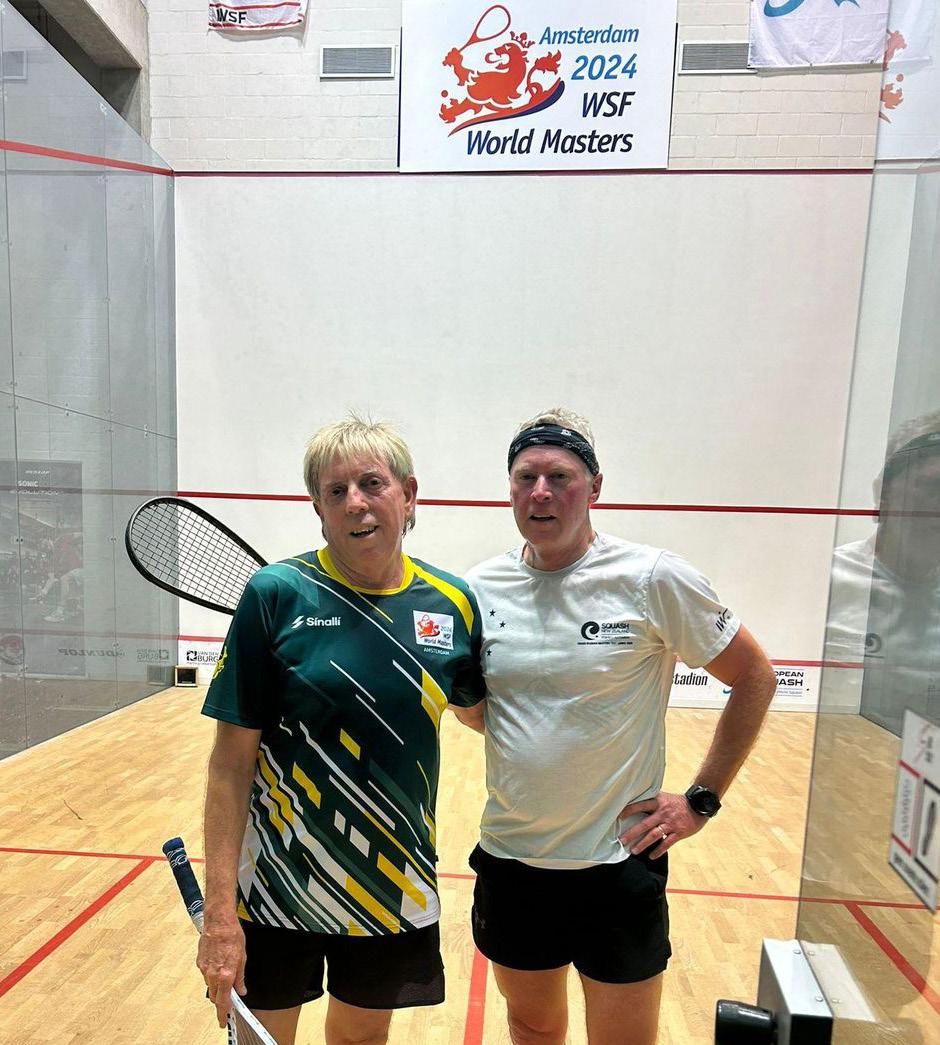
FINAL RESULTS FOR THE KIWIS:
Men’s 35+
Matt Nation 12th
Ben Murphy 34th
Yeshan Ekanayake 54th
Men’s 50+
Shane Johnston 41/42 =
Men’s 55+
Nick Griffiths 29th
Men’s 60+
Brett Meyer 7th
Tony Griffin 8th
Men’s 70+

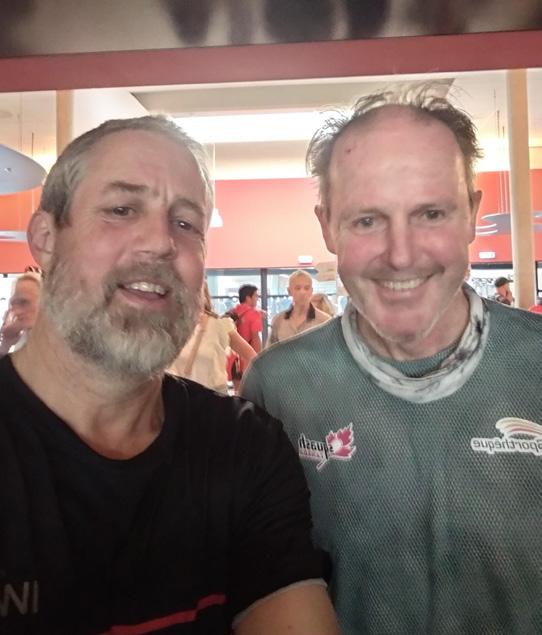
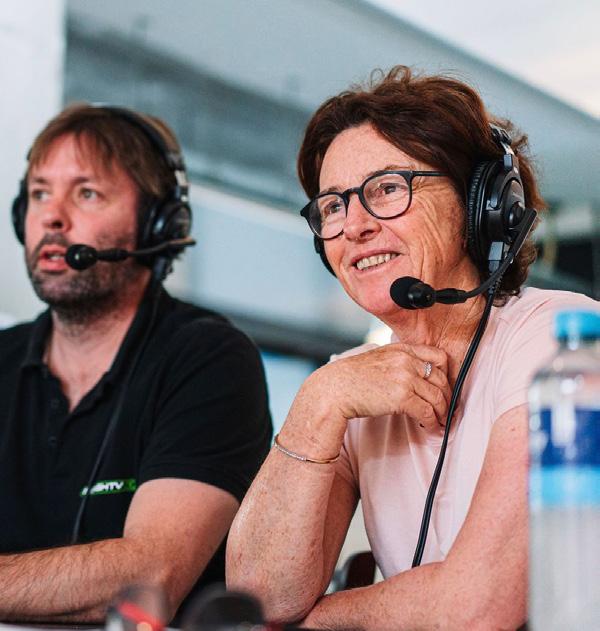
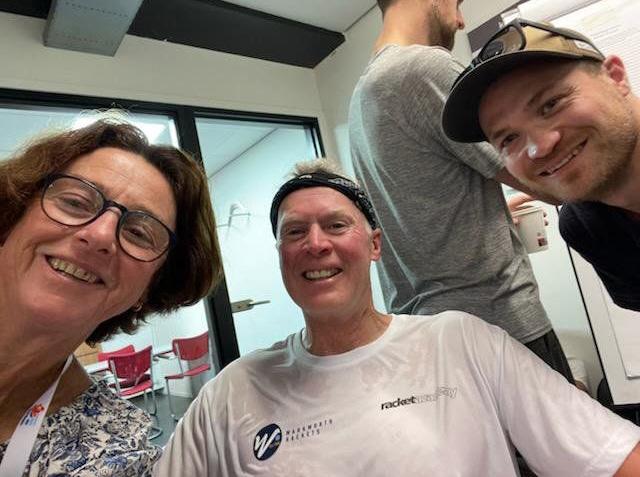
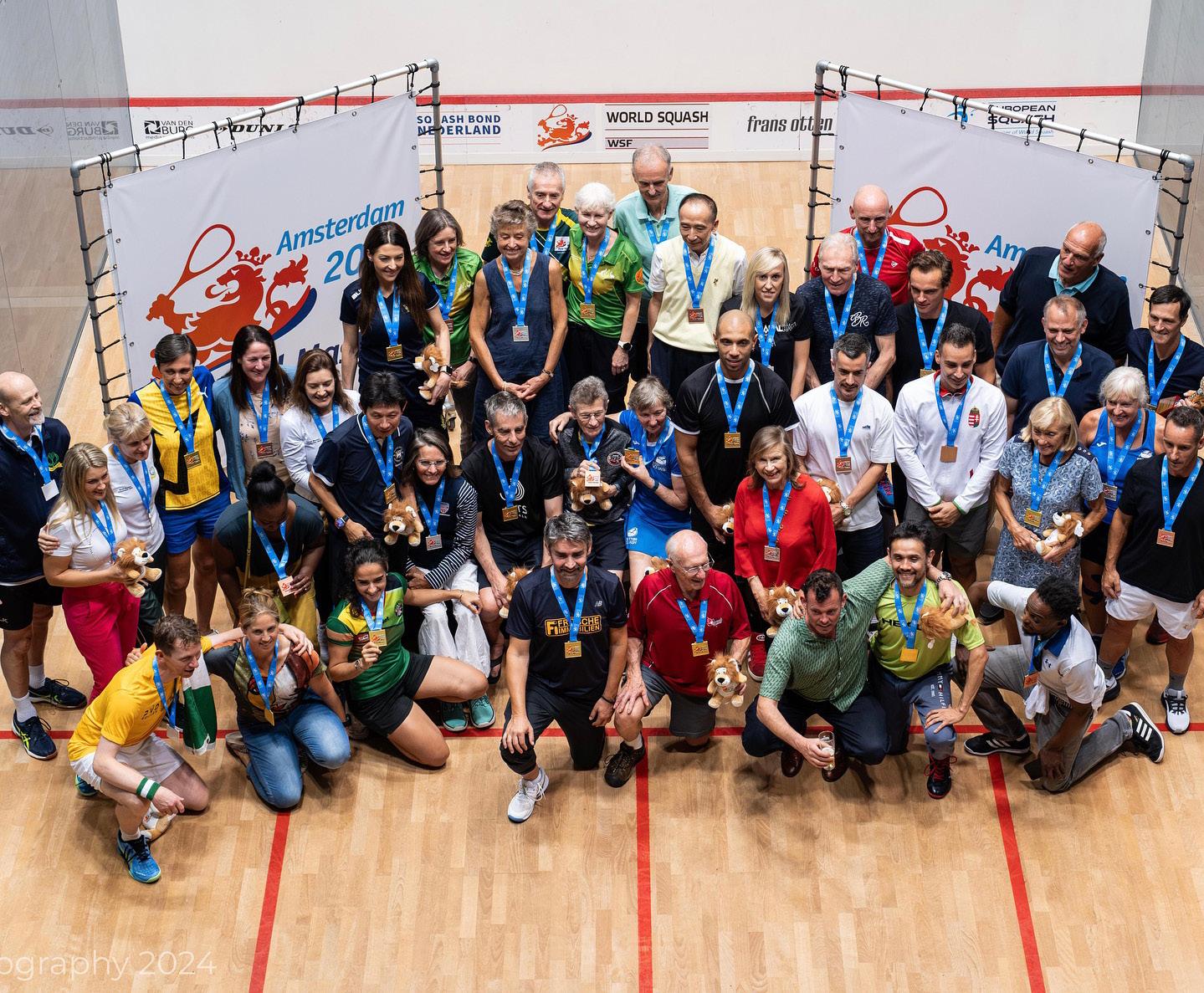
One of our most popular events, the NZ Masters Teams Event, saw an impressive turnout this year, with 40 teams travelling to Whanganui.
Such was the demand that we even had a waiting list for those who entered too late! This brought together 195 players, accompanied by numerous supporters, making it a lively and fun occasion.
Anneka Weterman, our dedicated Tournament Organiser and Controller, expertly managed the event, supported by a team of sixteen volunteers who worked tirelessly across the two hosting clubs, Whanganui Squash Club and Rivercity. Feedback from participants has been overwhelmingly positive, with special praise for the plentiful and high-quality dinner, perfect venue and having a massage therapist onsite!
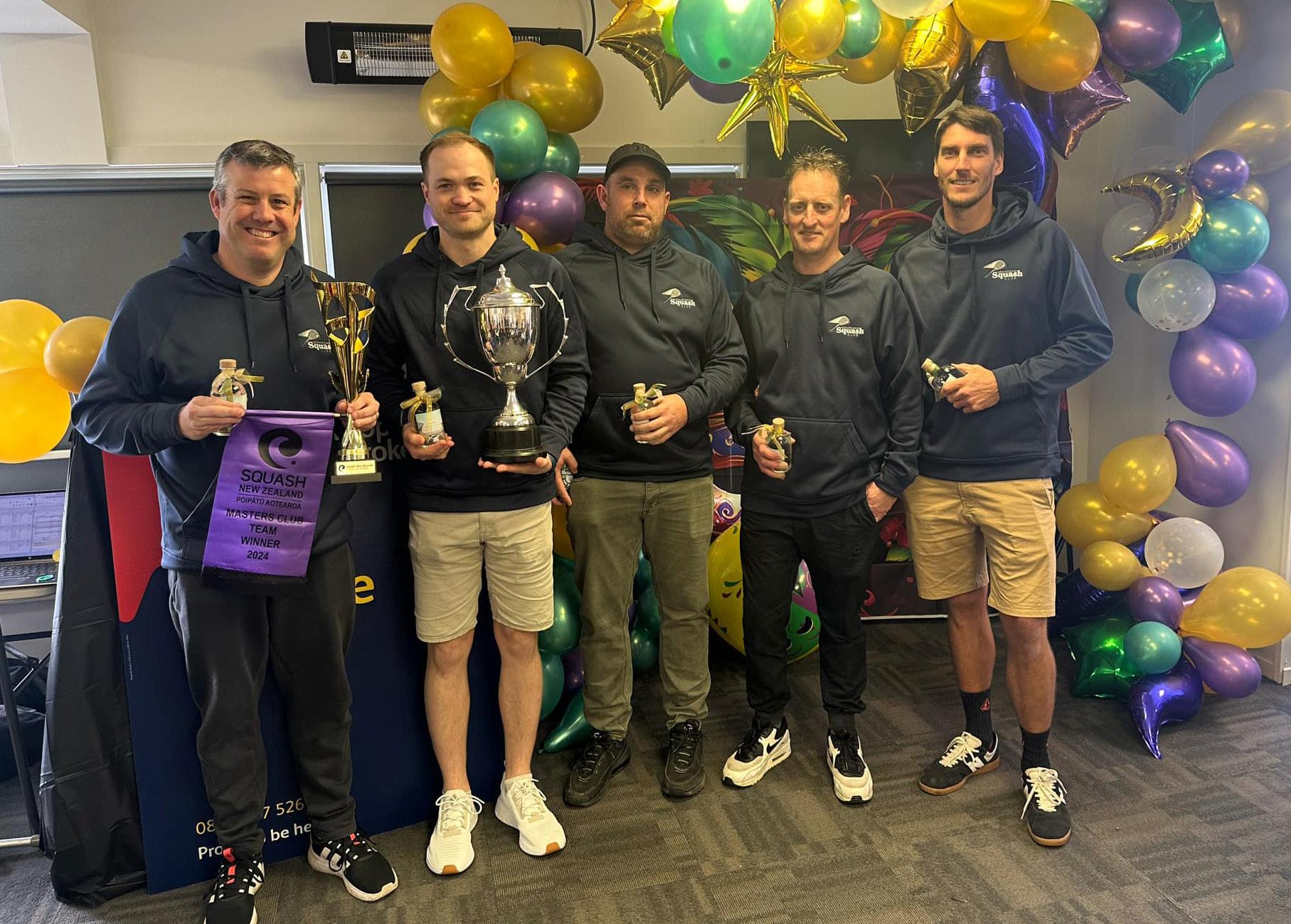
The player packs were a standout, loaded with products to soothe sore heads and bodies—no doubt fully utilised over the course of the weekend! The unique charm of this event lies in the equal commitment teams show both on and off the court. While the on-court intensity is a given, many teams channel their creativity and energy into the off-court activities, particularly the Saturday night function.
This year’s fancy dress theme was Mardi Gras, adding an extra layer of fun as participants danced and socialised, often not knowing who was behind the mask! As the weekend drew to a close, a very tired but satisfied group of players departed Whanganui—by car, team vans, or plane—many already planning or needing to take the following week off work to recover!
The most common question heard as everyone left was, ‘Where is it next year? We can’t wait!’
Winner: Whanganui 1
Runner Up: Tawa 1
Division 1
Winner: Manurewa 1
Runner Up: Tawa 2
Division 2
Winner: Royal Oak 3
Runner Up: Thames
Division 3
Winner: SquashGym 1
Runner Up: Taihape
Division 4
Winner: Whanganui 3
Runner Up: Putaruru 2
A massive thanks goes out to Ritesh and the team at Property Brokers Whanganui, the tournament’s naming sponsor, whose support was instrumental in making the event a success. A special shoutout also goes to the crew at Rivercity Squash Club, who partnered with Whanganui to accommodate the large number of teams, ensuring the weekend was as epic as it was unforgettable.
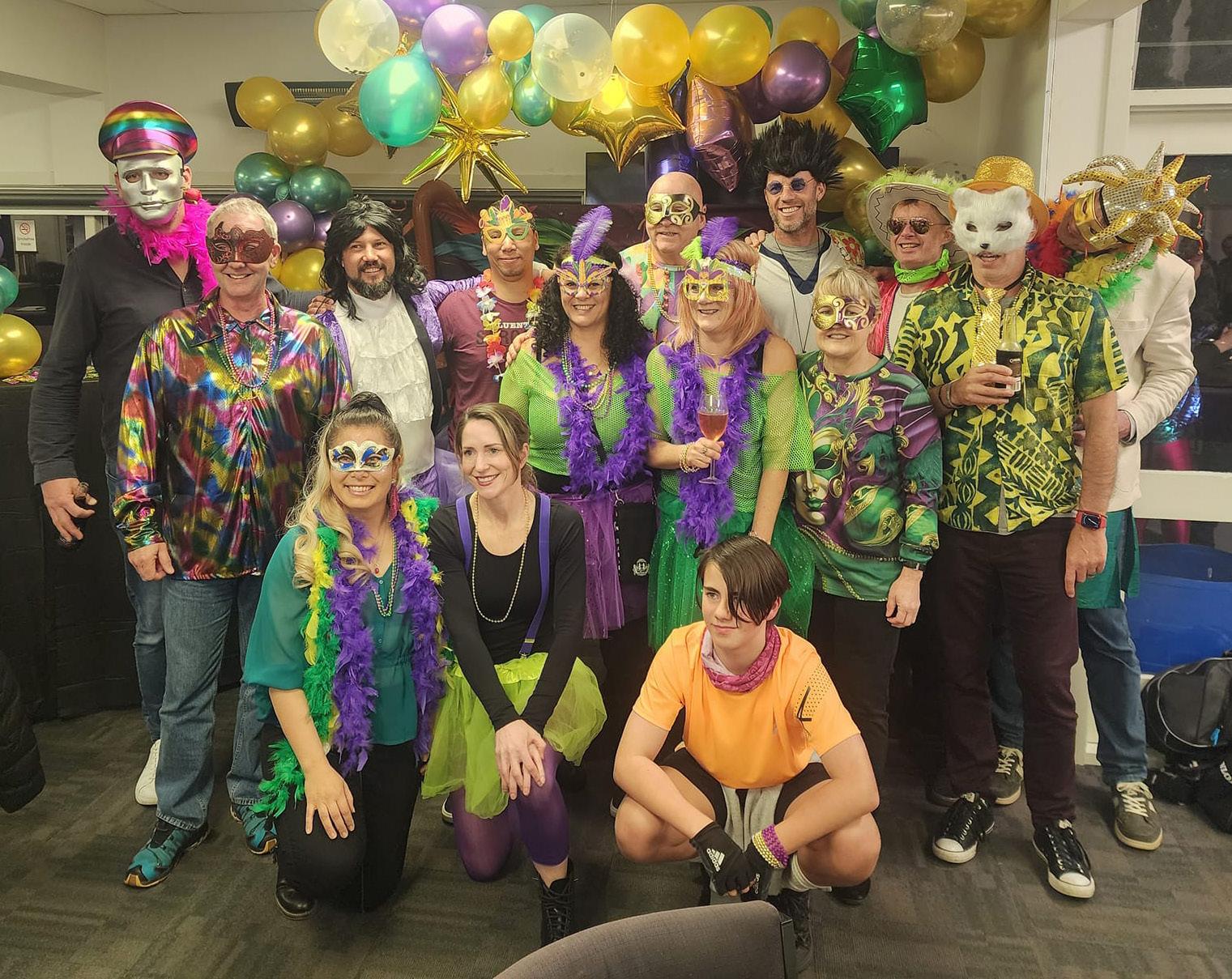
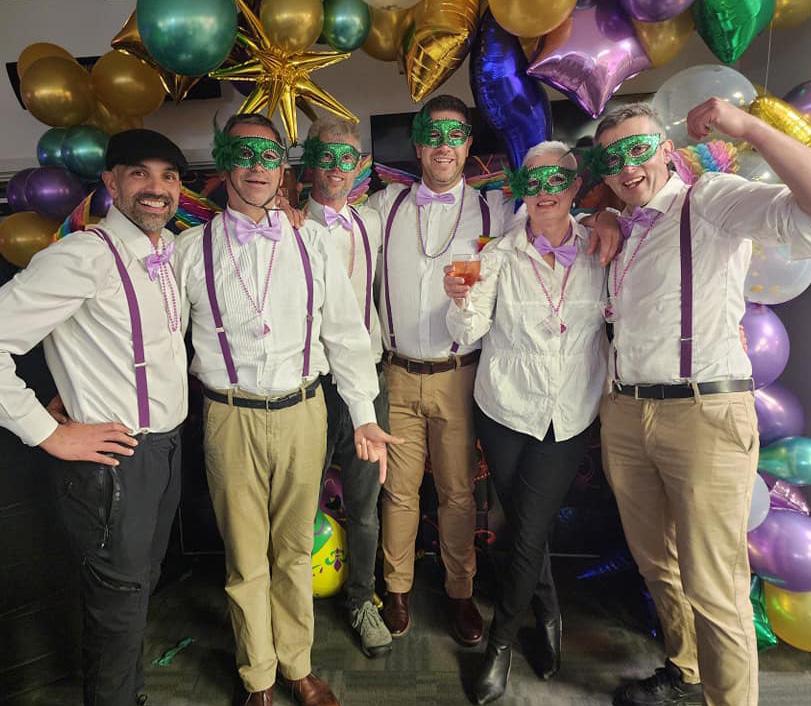
The Secondary Schools Trans-Tasman competition was host by New Zealand this year at the Hutt City Squash Club in the Ricoh Sports Centre.
Each team consists of five Junior boys, five Junior Girls, five Senior boys and five Senior Girls from New South Wales and Queensland. The competition ran from 19th - 24th September with a mix of both singles and doubles matches
The first three days consisted of singles matches with the NZ, NSW and Queensland teams playing off against each other across 3 time slots. New Zealand had a dominant start beating Queensland 20-0 in the first round for the first time ever. The next round NZ managed an 18-2 win over NSW. By day 3, NZ had secured the first trophy of the week with team NZ winning each round they played.
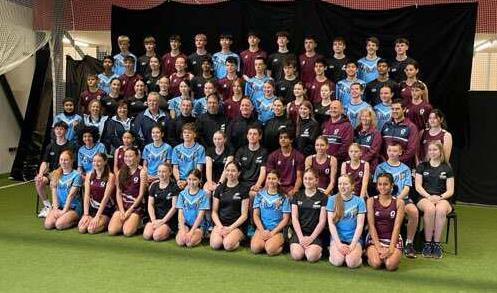
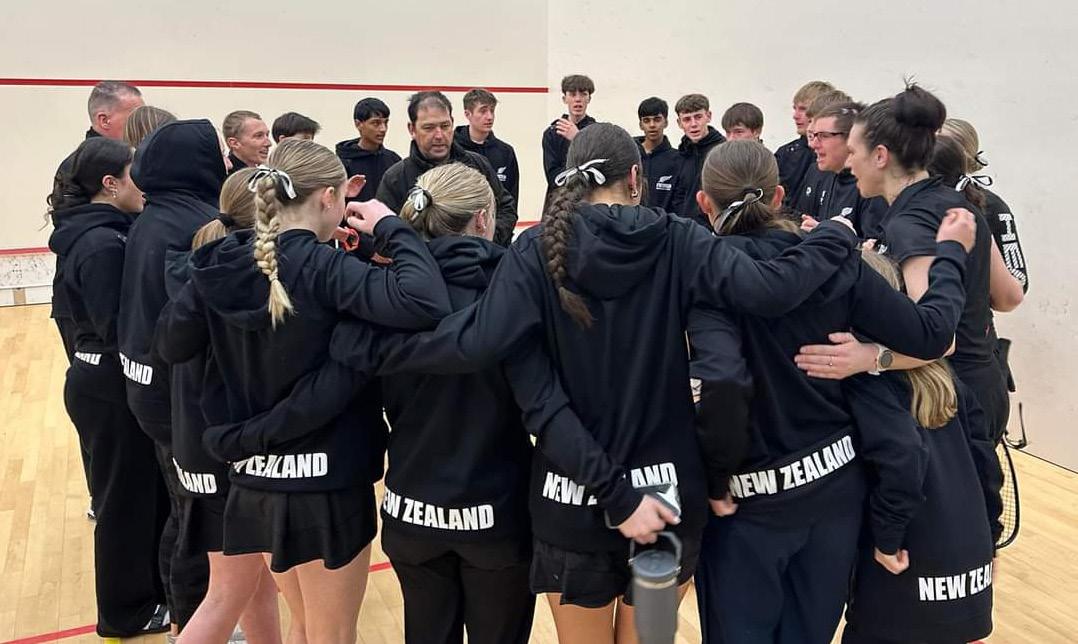
Day 4 had the Tran-Tasman Doubles title on the line. The Queenslanders had come out in full force, with the centre full of maroon and their supporters sporting some makeshift QLD apparel. However, the Kiwis had entered the building now to taking a 9-1 win. Next up team NZ played NSW winning this round 7-3 to retain the state doubles trophy as well.
Day 5 is the biggest day with NSW and QLD picking their top team to represent Australia for the final (and biggest) Trophy: NZ v AUS Trans-Tasman. The day started with doubles and finished off with singles. Team NZ pulled off their best performances of the week managing to win 25-5.
Congratulations to all the players, each of them should be proud of their efforts. NZ had a stellar event to retain all three trophies.
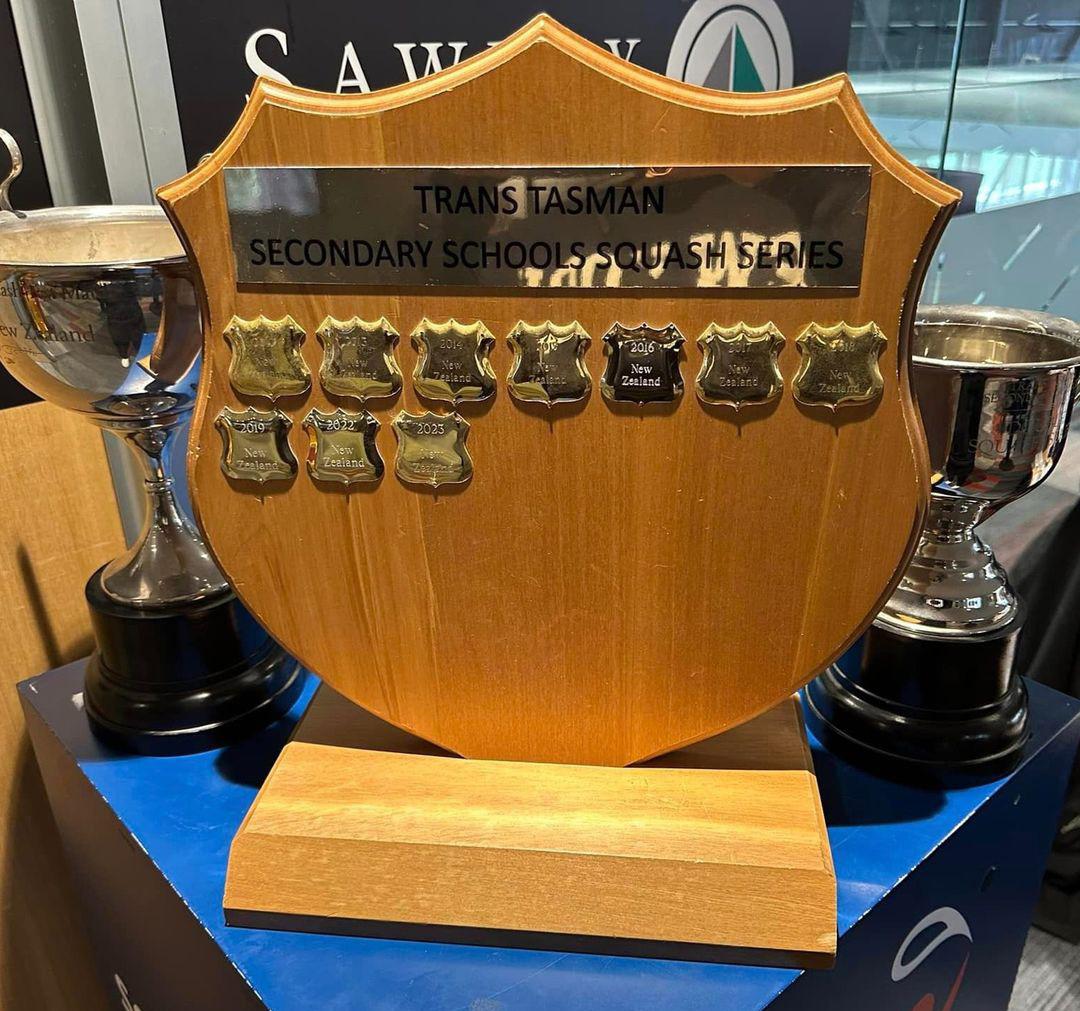
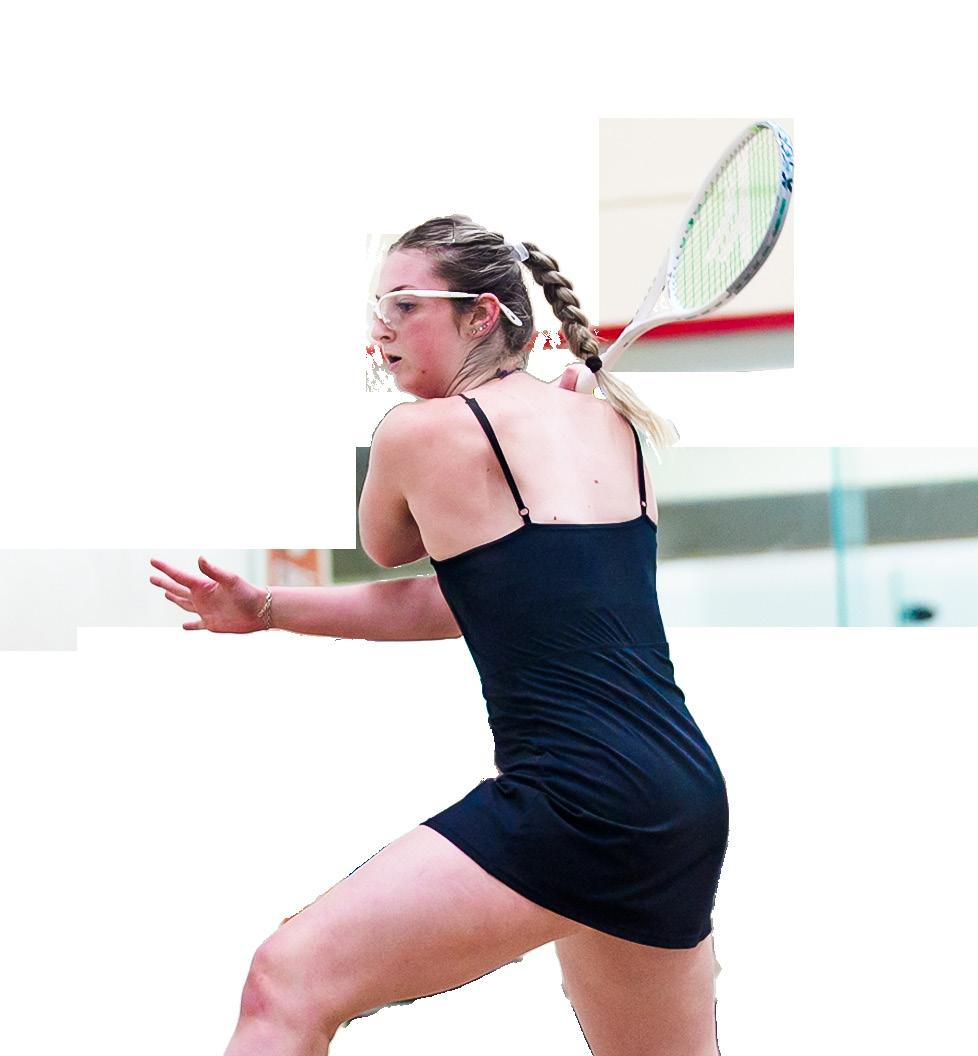
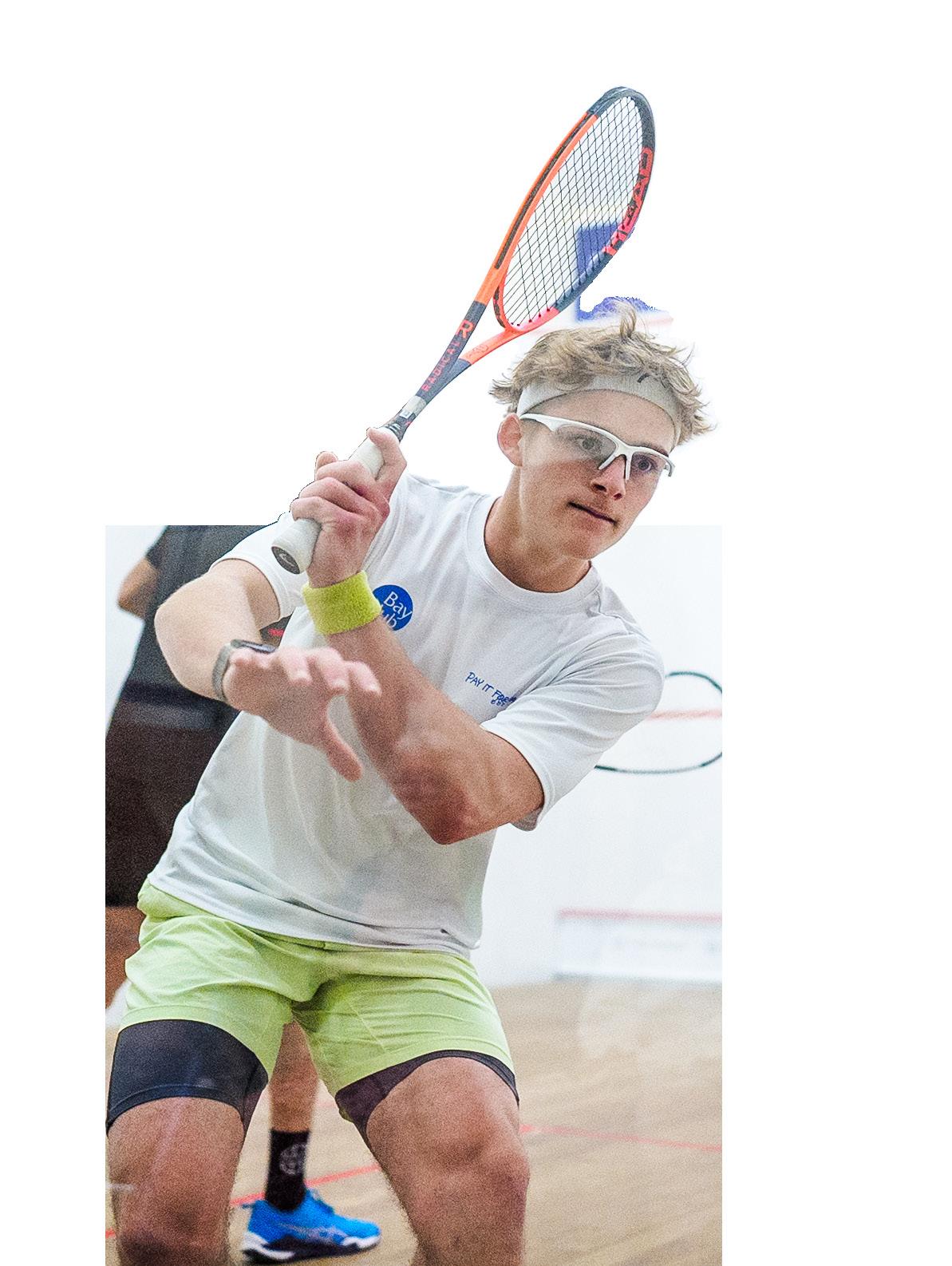
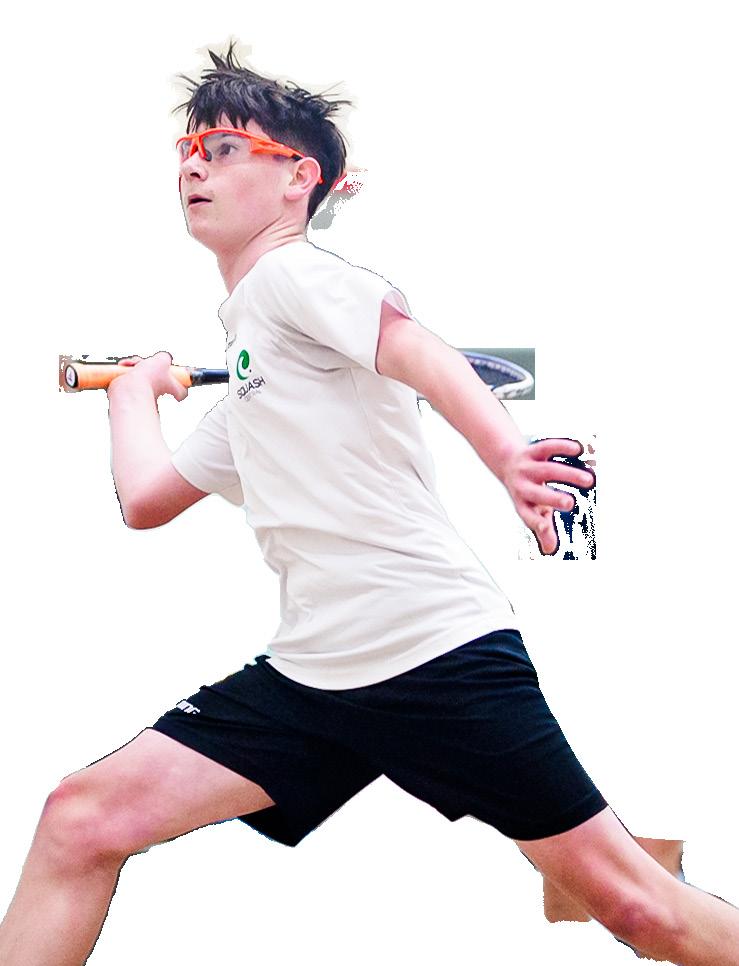
Finals will be played on the Isaac Theatre Royal glass court as an opener to the 2025 NZ OPEN
Enjoy 25% off tickets for the quarterfinals, semifinals, and finals with your WJO event entry!



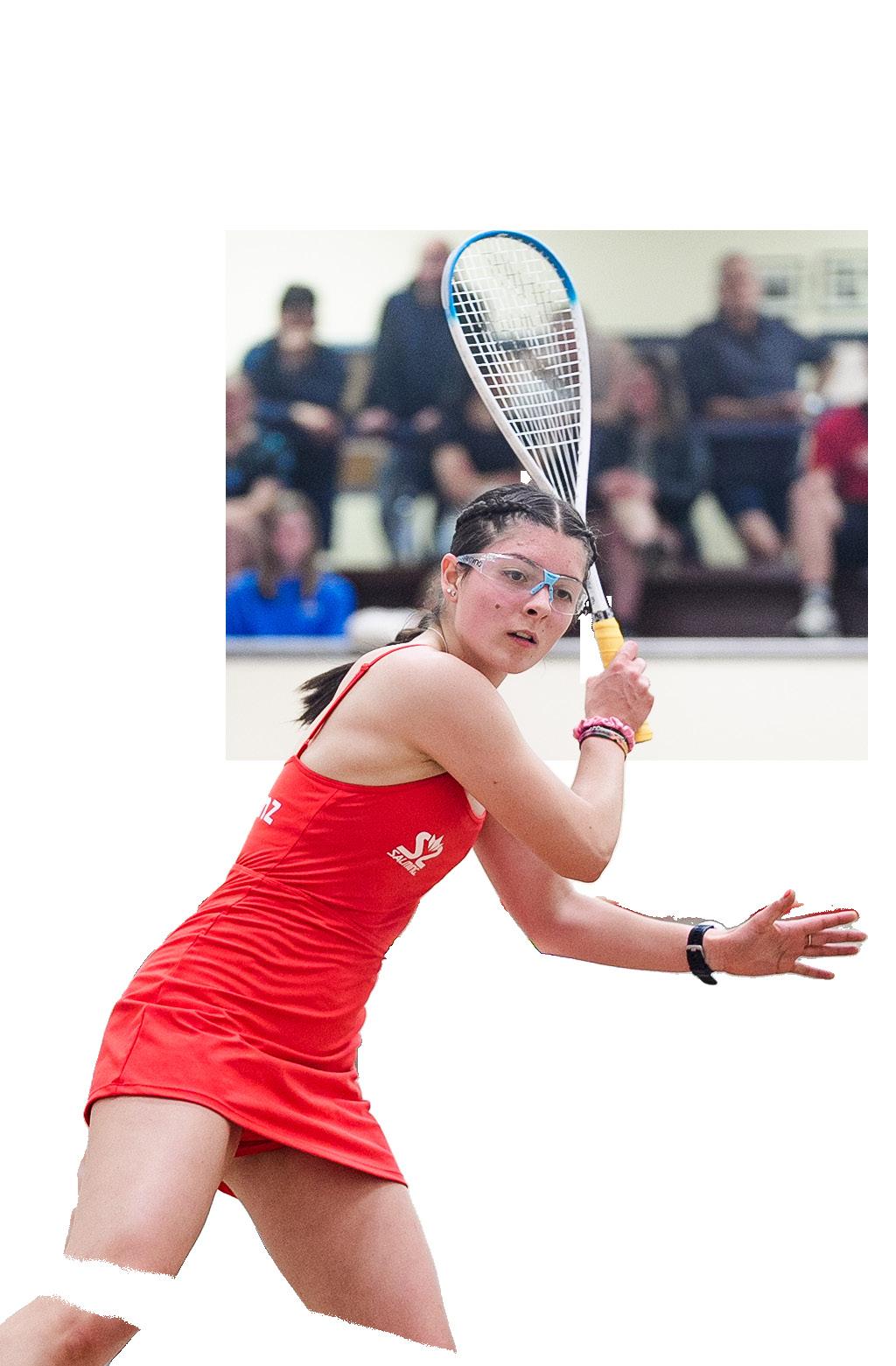
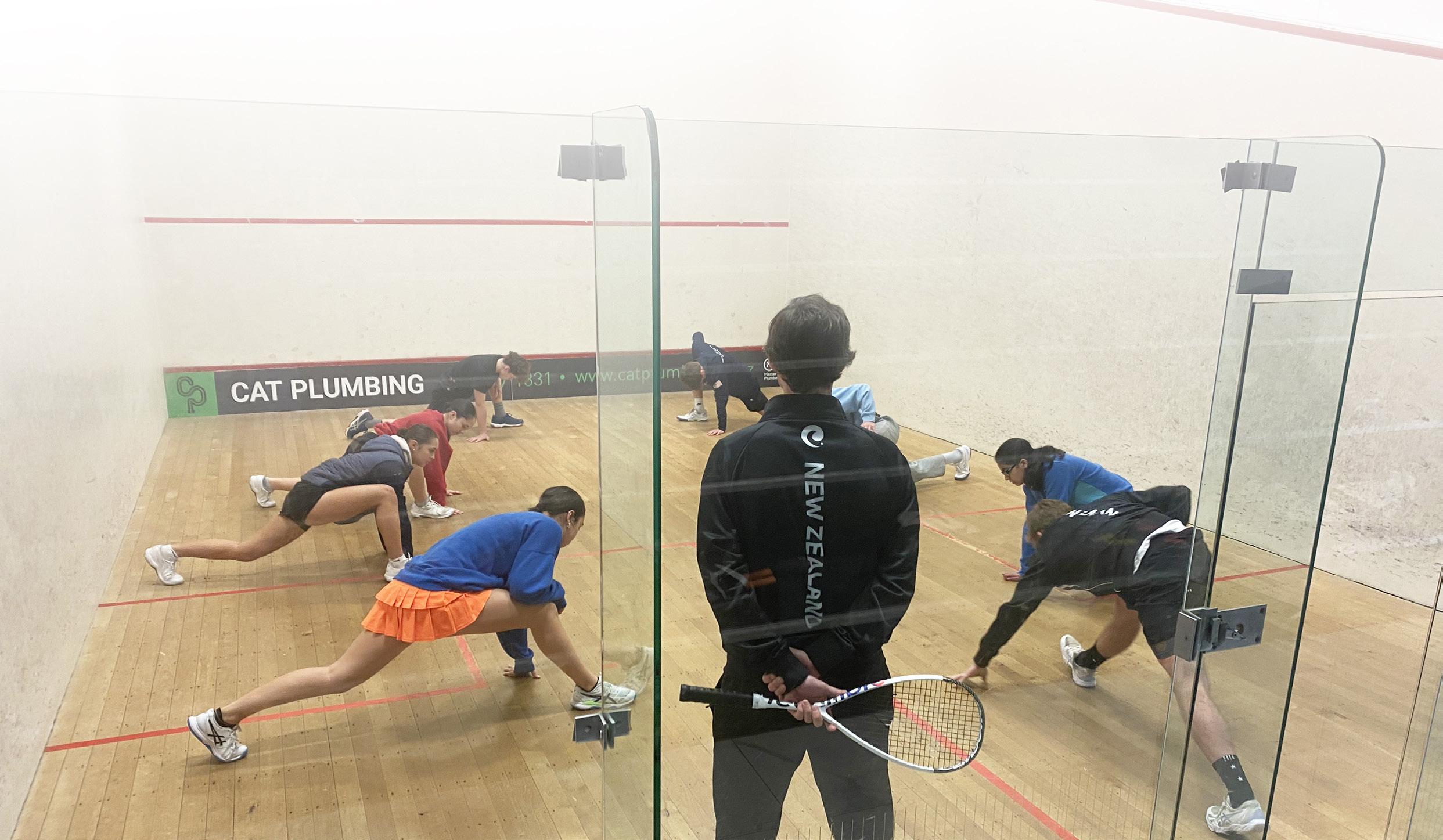
As we progress six weeks into Block 3, the focus has shifted to enhancing “national performance.” Under the expert guidance of Jonathan Kemp, regional training camps have been held in Auckland, Christchurch, and Palmerston North. These sessions have been pivotal in honing players’ ‘attacking skills and movement,’ pushing them to elevate their creativity on the court and working on their accuracy.
Jonathan’s strategy during these camps has been to inspire players to think outside the box, fostering a style of play that is both strategic and inventive. The goal is to advance their game by refining existing skills and integrating new techniques and strategies. This phase is all about pushing players beyond their comfort zones, encouraging a more dynamic and adaptable approach to their game.
As the year continues, two more national development training camps are planned. These will gather around 25 of New Zealand’s top young players for additional skill refinement and competitive preparation. These camps aim to go beyond technical skill enhancement, focusing on cultivating a high-performance culture and fostering camaraderie among the athletes.
With the competitive season nearing its end, players will be encouraged to take a well-deserved break from the courts. This downtime is crucial for both physical recovery and mental rejuvenation. The summer months will then be dedicated to rigorous fitness training, offering a valuable opportunity for athletes to make significant fitness gains without the interruption of tournaments.
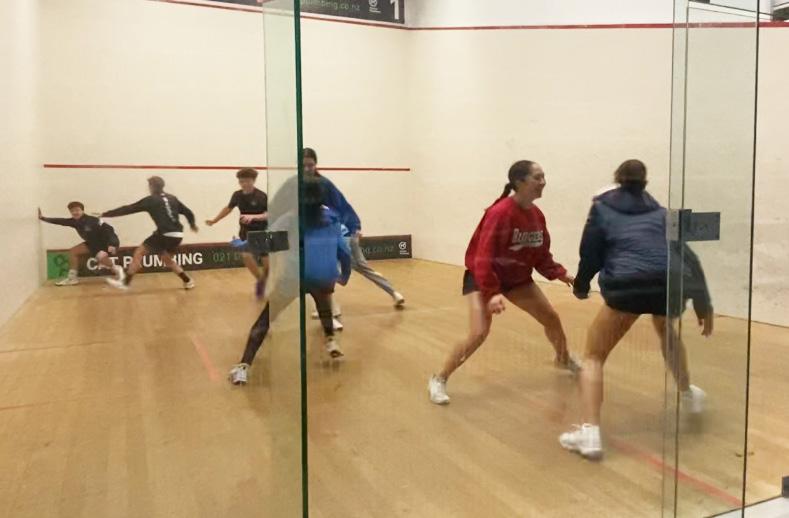
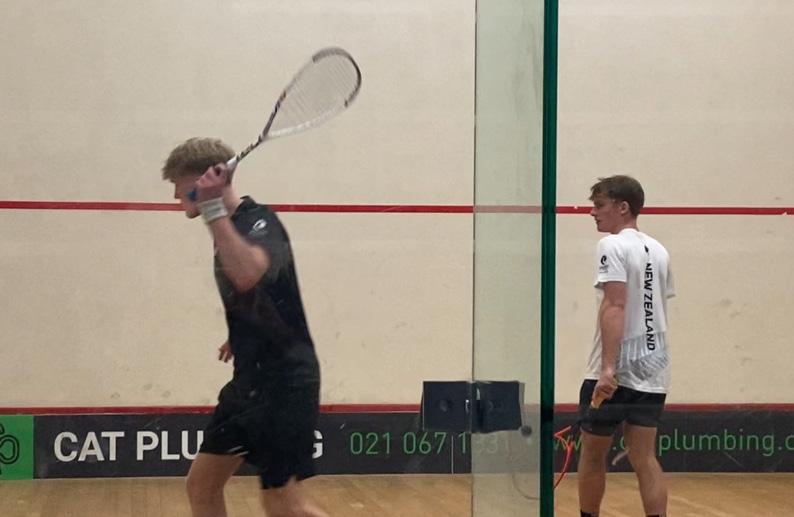
Becoming a top squash player demands unwavering dedication and resilience. The structured development programs are designed to build on the potential demonstrated throughout the season, with coaches, training programs, and performance experts playing a vital role in shaping the future stars of squash. As these athletes prepare for the challenges ahead, their commitment to training and growth will be instrumental in their success on the world stage.
The 2024 Senior Inter-district Teams competition was held from the 30th August - 1st September at Otago Squash Club in Dunedin. There were a massive 10 Men’s and 9 Women’s teams representing their districts.
The Women’s draw started off first round Friday with pool play, the draws were split into 3 box round robins, with the teams that won their qualifier draw moving into the Championship draw to play off for the top spot. After day 1 BOP, Central and Midlands topped the qualifier rounds to move into the 1-3 play off. Canterbury, Northland and Waikato in the 4-6 play off and Wellington, Otago and Eastern in the 7-9 pool. The BOP team proved to be too strong taking the top spot with Central taking second place.
The Men’s draw kicked off first round Friday with Waikato and Central progressing through the qualifying rounds. However, they met the top seeds later that afternoon, Wellington and Canterbury, who proved to be too strong. The Quarter finals started Saturday afternoon with Wellington overcoming BOP while Canterbury beat neighbouring district Midlands. The top two seeds played late Sunday morning in a tense final that went down to the wire, Wellington managed to clinch the win by 1 game over the reigning champions. It was great to see teams sticking around to support, it really added to the atmosphere.
Women’s
1st BOP
2nd Central
3rd Midlands
4th Waikato
5th Canterbury
6th Northland
7th Wellington
8th Otago
9th Eastern
Men’s
1st Wellington
2nd Canterbury
3rd BOP
4th Midlands
5th Auckland
6th Northland
7th Waikato
8th Central
9th Otago
10th Eastern
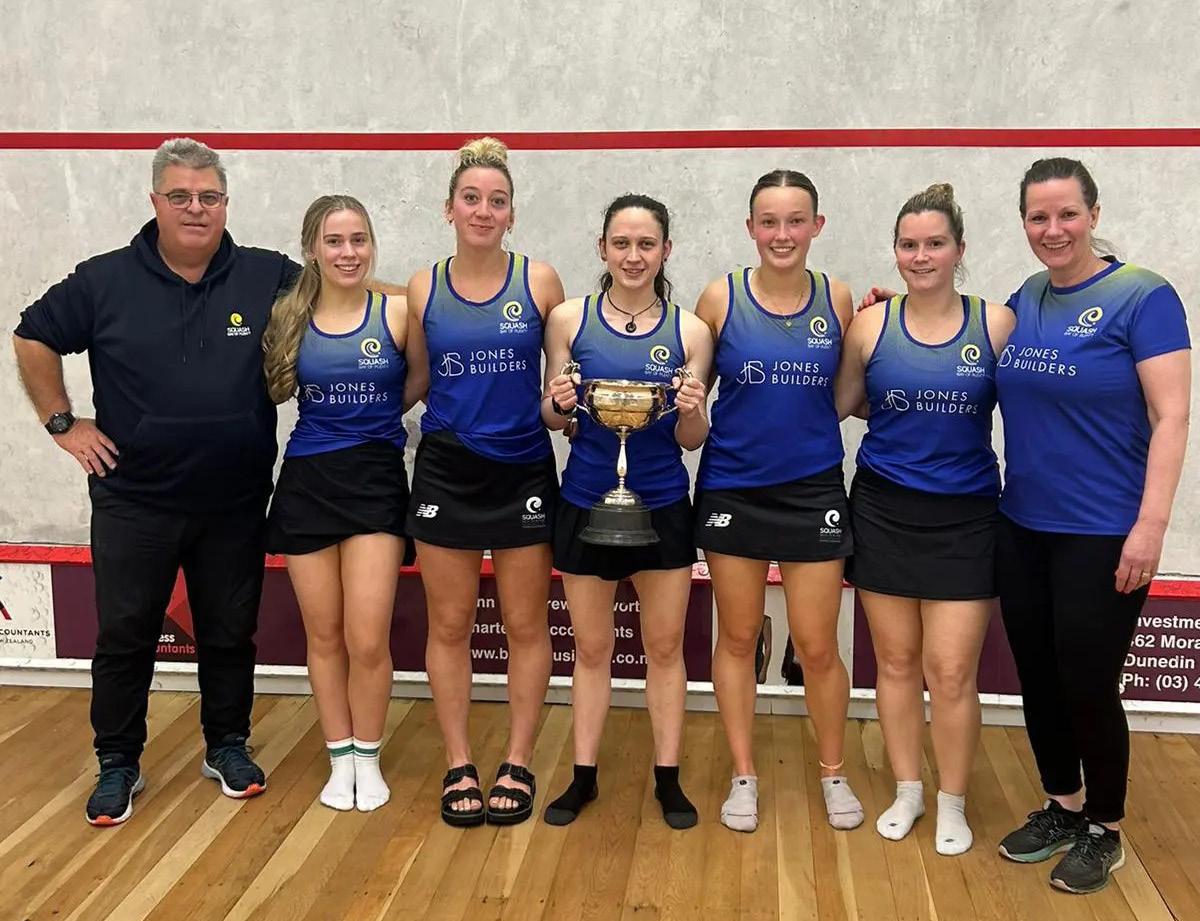
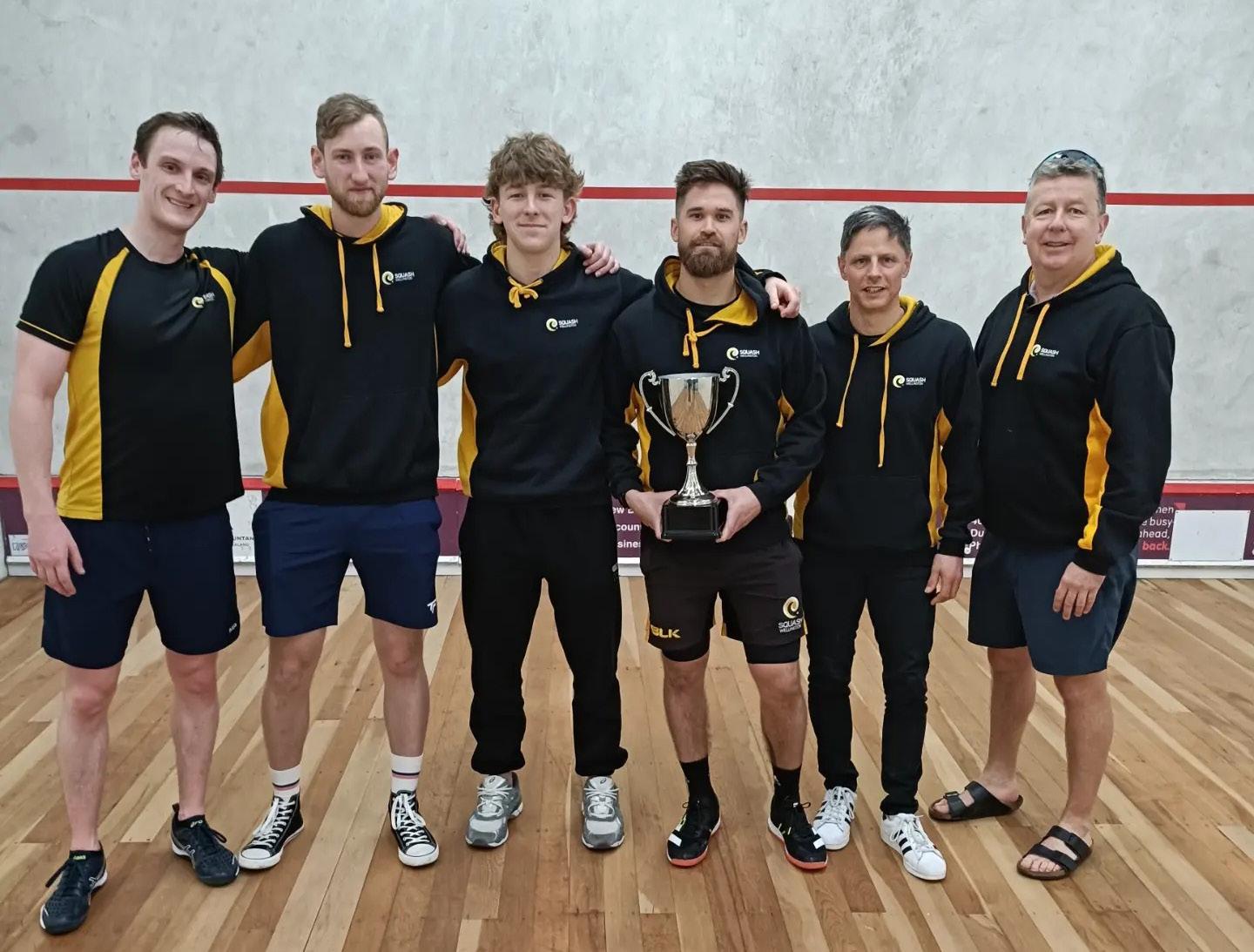
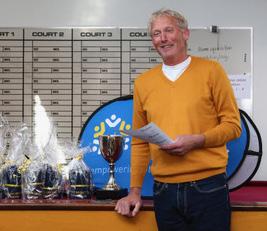
Gary Duberly, one of New Zealand’s top masters athletes, is facing his greatest challenge – battling a rare form of cancer which is attacking his heart. He spoke to Rob Drent - member of Devonport Squash Club and reporter for The Rangitoto Observer where this article was first published.
Gary Duberly is the first to admit he’s never been the greatest trainer. But he always loved being on a squash court.
“I was never one to be doing heaps of court sprints… I always felt match play was the best way to train,” he said. This attitude had him playing squash most nights of the week and most weekends: interclub games, and more than 25 tournaments annually, culminating in excess of 100 competition matches in a year. He kept up this gruelling schedule for the best part of the last 20 years.
His commitment and flair carried the 59-year-old to more than 10 New Zealand age-group masters titles, two Australian masters titles and World Championships in Christchurch in 2008 (mens 40-44) and Cologne, Germany in 2010 (mens 45-49).
He was a key member of Auckland and New Zealand masters teams over the past 25 years. He recalls one golden week in 2022 when he swept through all his matches in the Australian Masters competition and the Trans Tasman test series unbeaten – close to 10 matches.
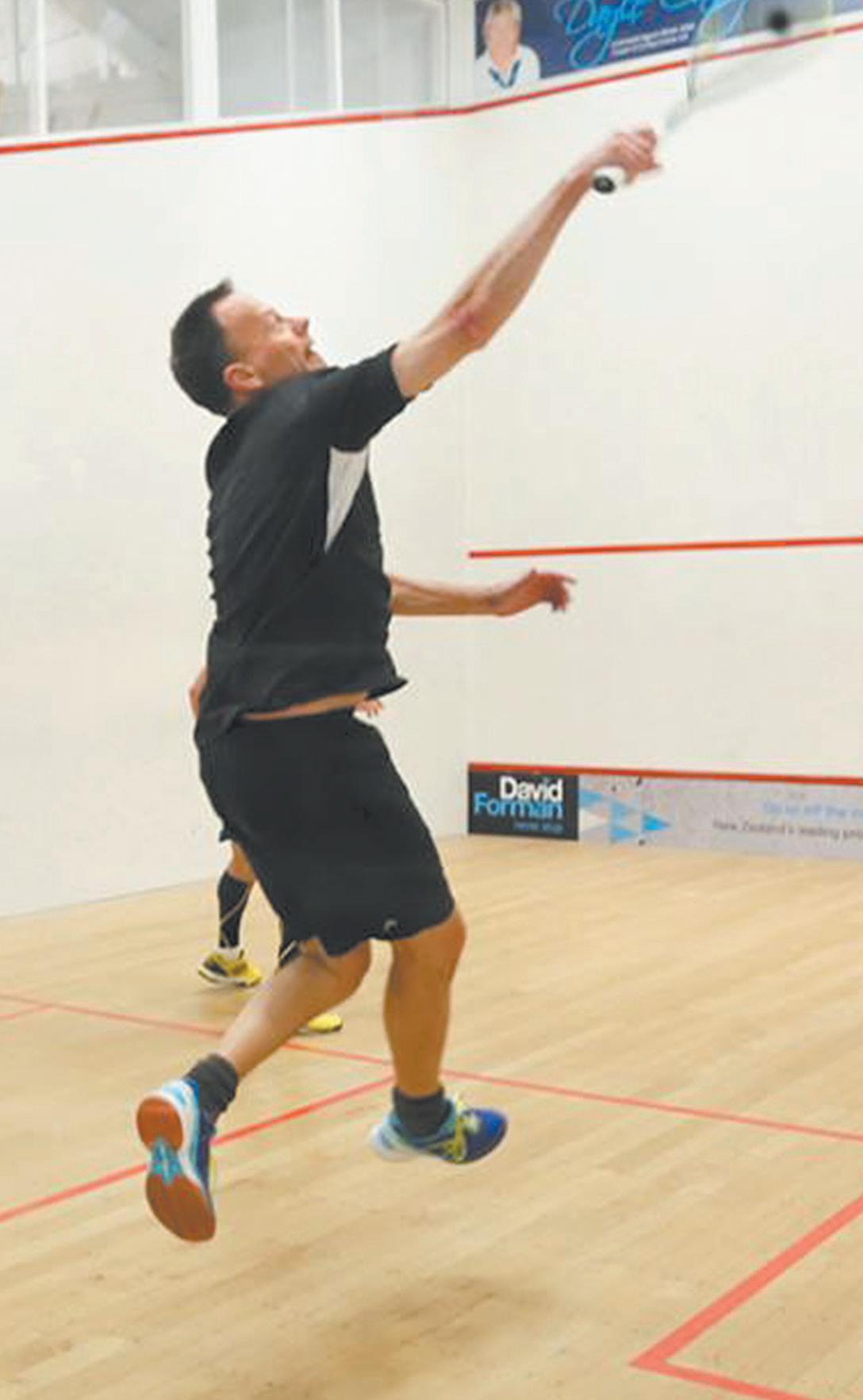
Duberly was planning his usual big season. Visiting his brother in Thailand over Christmas in 2022, he’d even been going to the gym. But back in New Zealand playing his squash mates at North Shore he started “battling for breath and feeling very unfit... I was struggling against players I would usually have no trouble with.”
His physical decline became apparent at the national teams championships in Christchurch that June. “I had some shocking matches, losing to people who I have never lost to before.
“My daughter Tyler said ‘there’s something wrong Dad. You’ve got to get checked’.”
Back in Auckland, Duberly filled in for his interclub team the following week. It is likely the last squash game he will play.
Duberly’s father had a history of heart issues, so initially cardiologists focused on that organ.
However, after months of exhaustive testing nothing seriously wrong was found structurally with his heart.
But in-depth blood tests were then conducted which found Duberly was suffering from myeloma – a type of blood cancer.
“It was a great week... I was always very proud to represent New Zealand,” he said.
To spectators, opponents, teammates – and Duberly himself – his natural athleticism and unpredictable shotmaking seemed to indicate he could carry on his masters career into his 60s, 70s and beyond.
He had a squash calendar planned years in advance: last month he was supposed to be in Amsterdam for the World Squash Masters Championships.
But within a few short months last year it was all over.
While myeloma can be treated, though not cured, in a rare complication it was producing excess proteins which were attaching to his heart, a condition called amyloidosis.
The result has been “very restricted heart function –I can’t walk up stairs and often if I get up quickly I get dizzy,” Duberly said.
“I had to come to terms with the fact that I would not play squash again, which was very hard because squash was such a big part of my life.
“But I was thankful I could still see my friends and family – still play golf.”
Golf was soon taken away as well, however. “As I deteriorated I could not play golf any more, either. During a couple of rounds I almost passed out.”
It was a massive transformation for someone who could play top-level squash for a couple of hours, with a heart rate going at more than 160 beats per minute.
Duberly undergoes chemotherapy every Friday and is also on daratumumab to help control the production of the excess proteins in his heart. The drug is currently unfunded by the government and costs $10,000 a dose. His dosage is up to twice a month, something Duberly has been paying for himself up until now – with a little help from his friends.
The squash community has rallied round through a Givealttle page (up to around $39,000 so far), various tournaments and fundraising events.
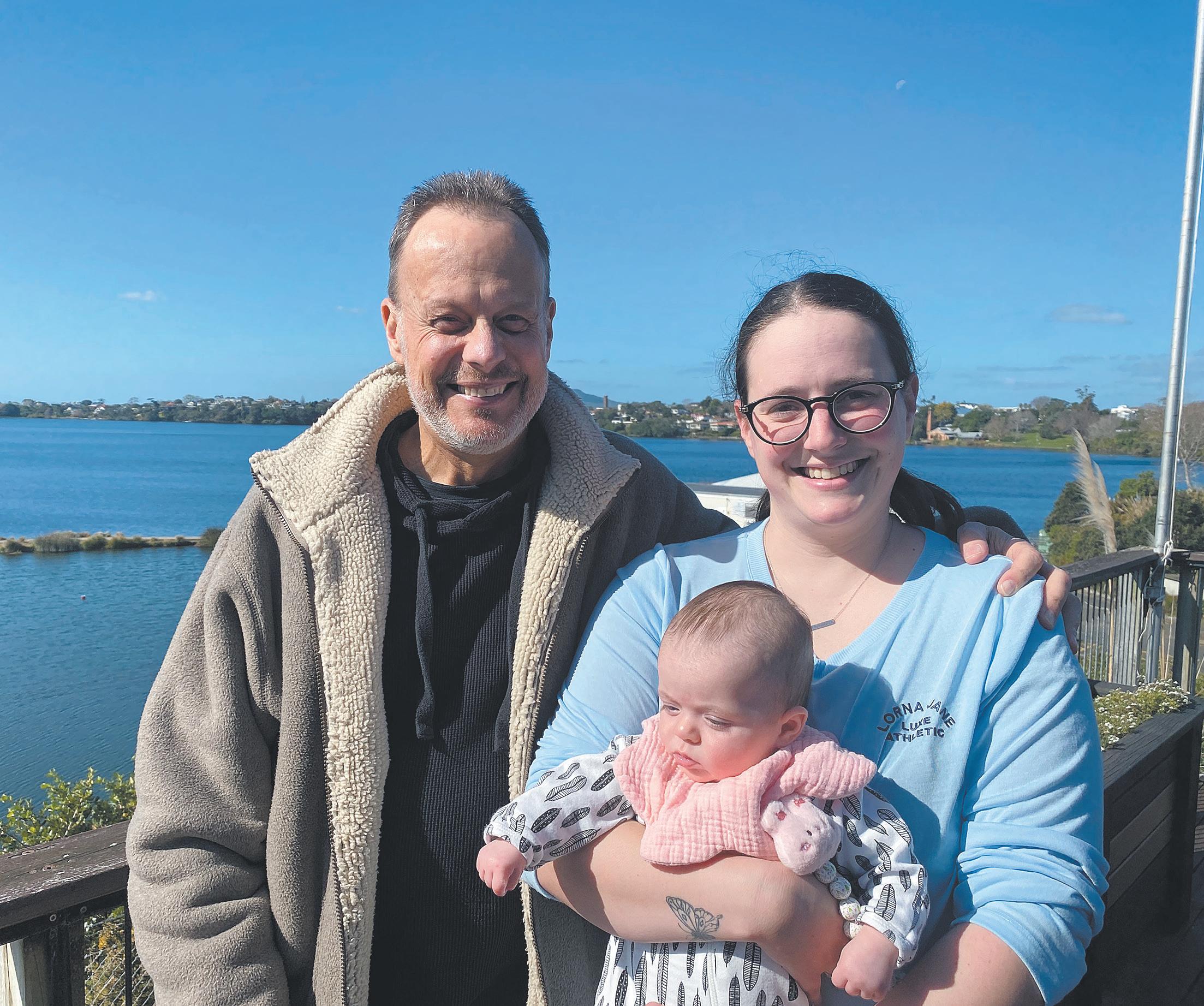
“I’ve been so amazed by all the support I’ve had... squash people have been so amazing since I arrived in New Zealand.”
Born in Zimbabwe, Duberly shifted first to Durban, South Africa before emigrating to New Zealand in 2000 with then wife Angie and daughters Tyler, and Jamie. (A third daughter Danielle was born here.)
He had represented Zimbabwe in the mid-1980s and been a top-20 player in South Africa. “One of the first things I did [in New Zealand] was join a squash club.”
became a New Zealand Squash board member, something he aims to continue as he winds down his accountancy practice.
Good news arrived this month with Duberly’s insurance company agreeing to fund the drug used to treat the cancer affecting his heart. And, three months ago, he became a grandfather to Violet.
I’ve been so amazed by all the support I’ve had... squash people have been so amazing since I arrived in New Zealand.
A player he met, fellow accountant John Vincent, went on to become his boss, and then business partner in Duberly Vincent and Associates, a well-known North Shore firm.
Duberly’s first tournament was a masters event at Belmont Park where he was graded B2. He won all his matches hardly breaking a sweat and was quickly regraded to B1. Within a year or so he was an A1, an elite level player, and in New Zealand’s top 10.
“I came here when I was 35 and could not believe the squash scene – it was phenomenal.”
In South Africa he could play seven or eight tournaments a year. In New Zealand he could play 26 to 30 tournaments. Duberly had found his squash heaven. In addition to his sporting accolades, he recently
Without treatment, Duberly estimates he has six months to live. If the treatment succeeds, he thinks he has two to three years, hopefully more.
“But I feel lucky. I’ve lived in three countries, I’ve got three daughters and a granddaughter.
“I played a sport I loved and I did reasonably well as a non-professional squash player. I’ve made great friends and met some amazing people.
“Some people live to their 80s or 90s but won’t have been as fortunate as I have been even if I only live to my 60s.
“I remember Richard Purser (a former New Zealand badminton and squash rep) saying to me ‘play as long as you can, because you never know when you won’t be able to because of your body’ – and I have done that.”
Ever competitive and optimistic, Duberly hopes to make a return to the golf course and to be able to travel again.

It was fantastic to see Joelle King back on the world stage who started the CIB Egyptian Open 2024 and took a game off world number 9 Subramaniam from Malaysia.
We also wish Paul the best for the final rounds. Paul obviously had a very special break marrying his longtime partner Nele Gilis. His quote following his thirdround win was “The wedding was better than we could ever imagine, but we didn’t go on a honeymoon, we probably started training the day after we got back!’
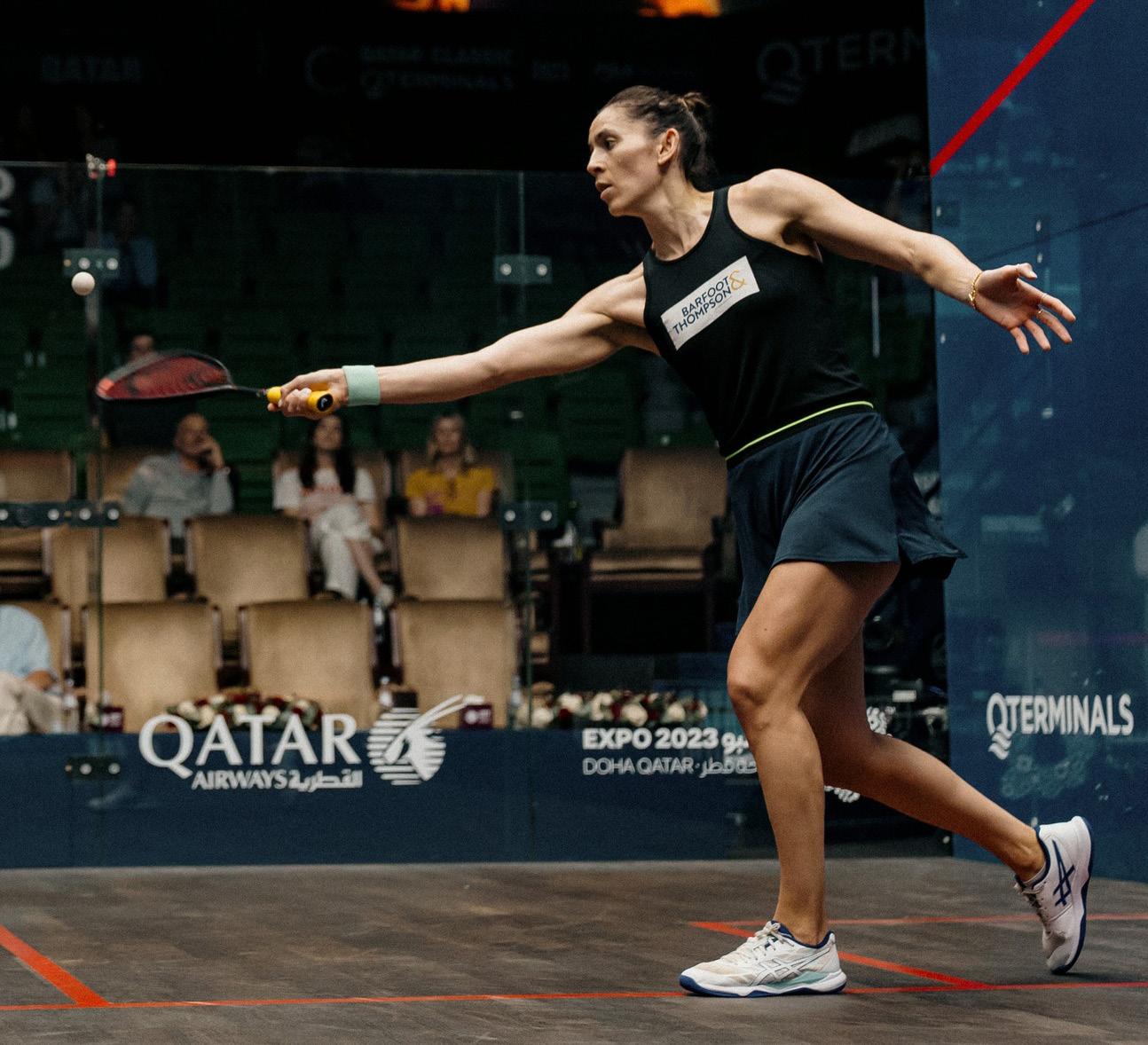
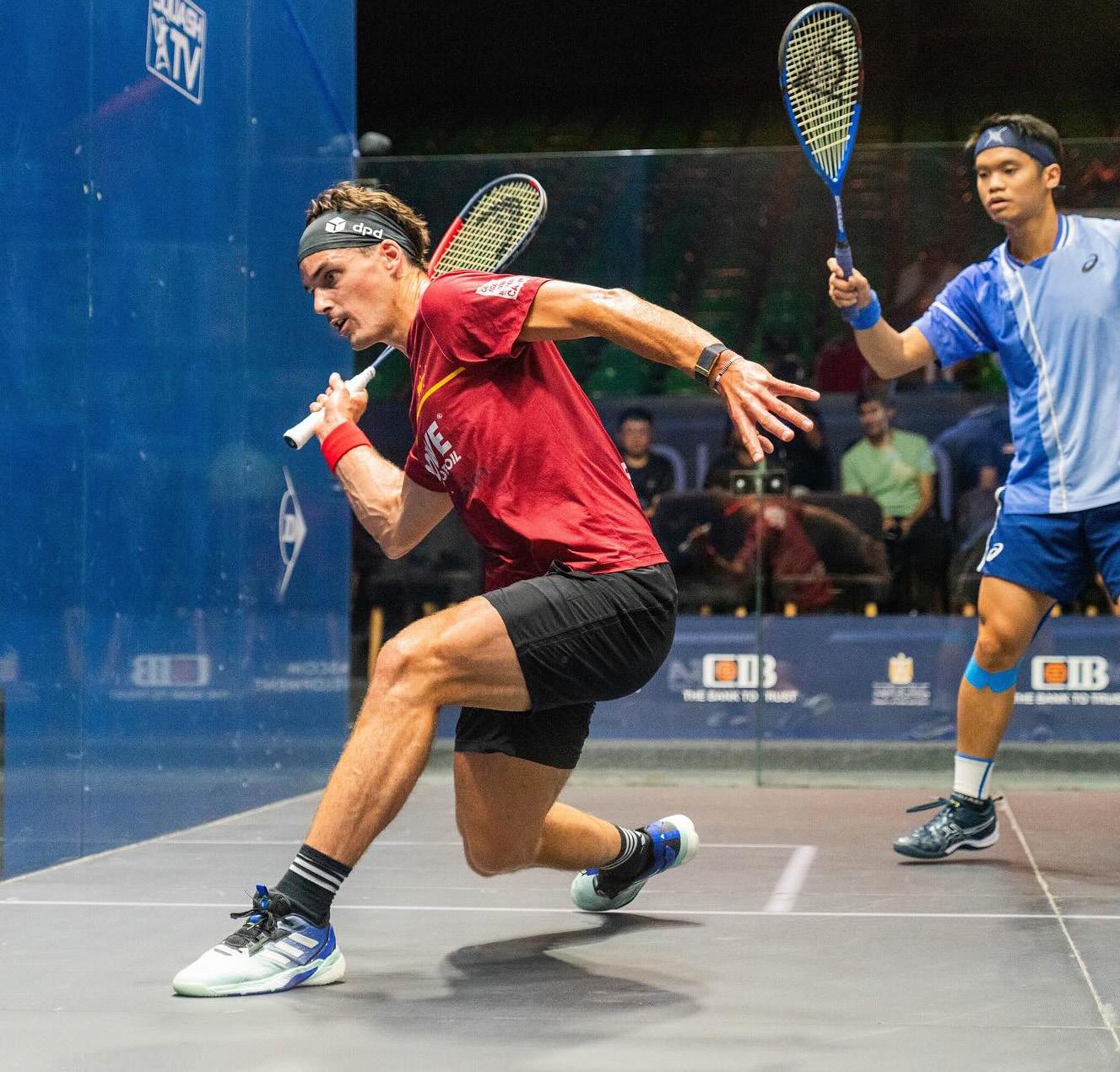
Q1: Which is bouncier, a blue dot or a red dot ball?
Q2: Who was the 2023 winners of the Inter-district Senior teams?
Q3. What was the first year that Superchamps was contested?
Q4. What club has the most back-to-back wins in the National Superchamps?
Q5: Who is the National Coach Development Leader?
Q6: What year will Squash be debuting at the Olympics?
Q7: Per Capita who has the most Squash players, North Island or South Island?
Q8: What age group has the highest number of Squash players?
& 84),
A few questions we asked them about the project:
Reason for getting work done:
The club was on a roll with successful funding applications from various trusts, and so after reviewing the benefits of a sprung flooring system, the committee decided to upgrade. The existing court floors were the great old tongue and groove system made of native hardwood but was hard on the older players with hip/knee injuries. Upgrading to 3 new ‘sprung’ floors would also reduce ongoing maintenance costs and lead to a better experience for their members by ensuring a top-class facility. The flooring at the Devoy Squash and Fitness Centre in Tauranga were a large inspiration.
What you considered when looking at a contractor?
Cost and time frame were the biggest considerations. Choosing someone that has experience with Sports flooring and has a proven track record. The floor came from Scandinavia.
Cost of project:
$35,380.90 for 3 courts (2015). Worth noting that the Club removed the existing floor themselves to reduce cost. Generally, the cost per court can range between $15,000 and $25,000. A lot of this cost will depend on the amount of work required to ensure a stable base underneath the floor.
Learnings:
1. Probably the amount of dust. Try to ensure you have good ventilation or something in place for the removal of dust along with protective gear.
2. With the old floors being native hardwood, it was cut into manageable squares and sold on as a recycled product.
3. Would recommend getting the lines painted on as the tape will not stick to the timber as it has a rough finish.
4. The floor was upgraded in 2015, and they have since resanded the courts 2 times, as they get worn down and become slippery.
5. Took a bit to get used to playing as the surface was initially ‘rough’ and the ball would travel slightly different, and the nicks played different with a slightly larger gap down the wall (to allow for the natural expansion/shrinkage of product).
Overall:
All in all, they were very happy with the results. Big effort by the club to remove the existing floor themselves, as it was a very interesting and dusty job, but well worth it. “The spring in the floor is definitely a game changer for knees and hips”. At their open day, the oldest member Stewart Morrison (70yrs) and youngest Zezima Waitai (5yrs) played a game. (Pictured).
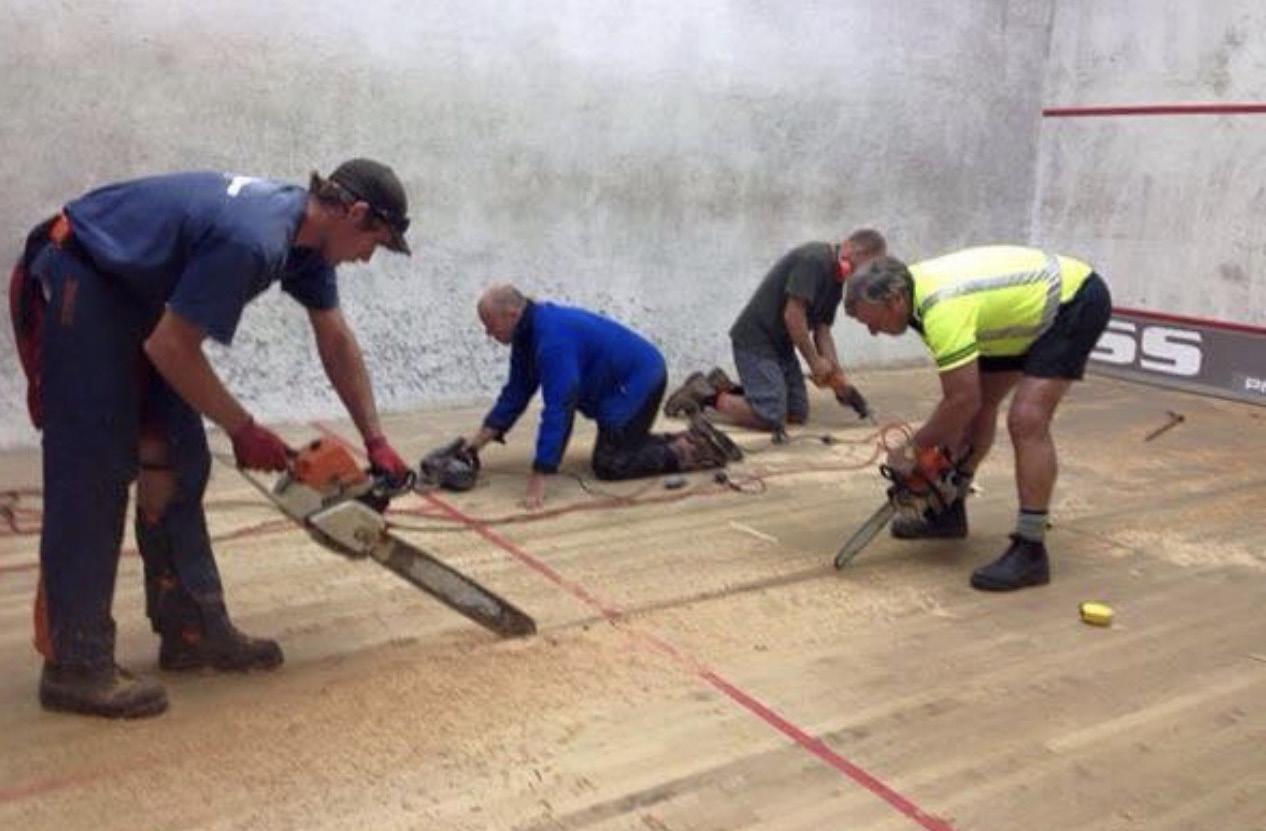
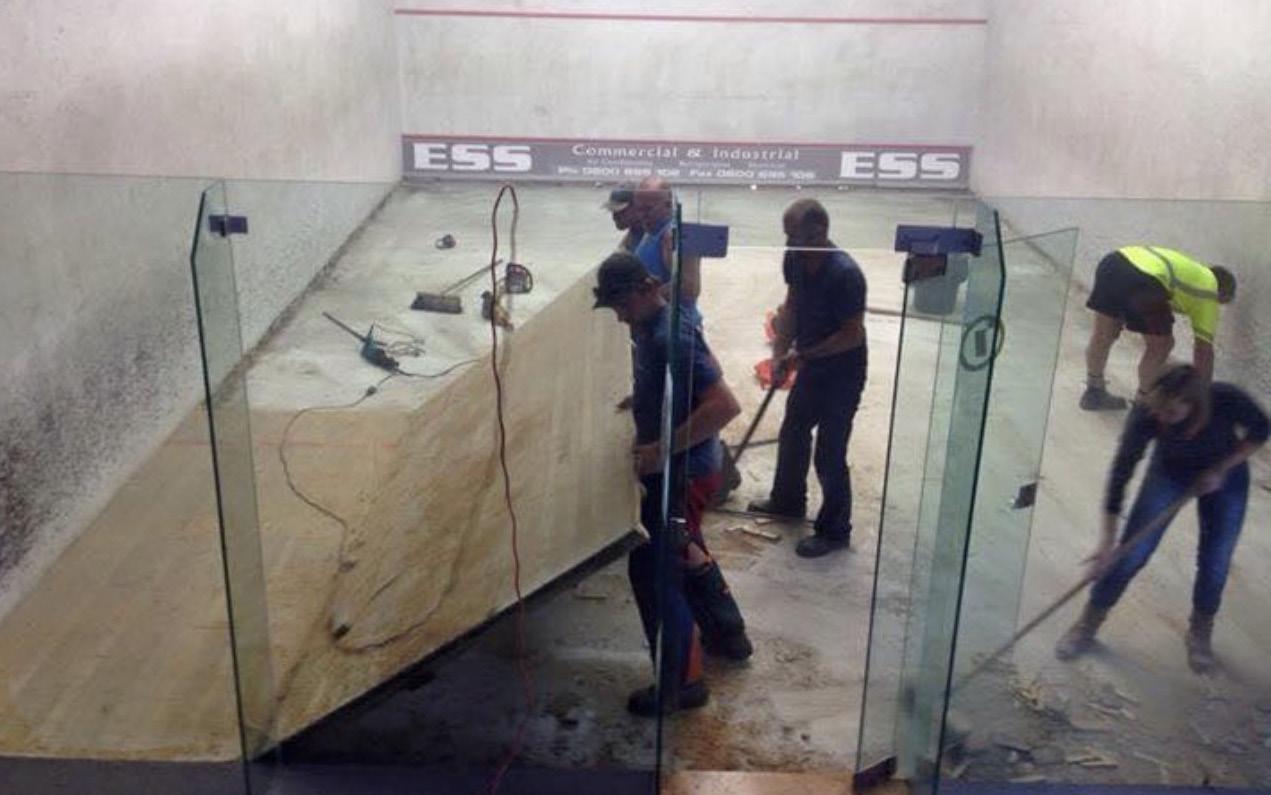
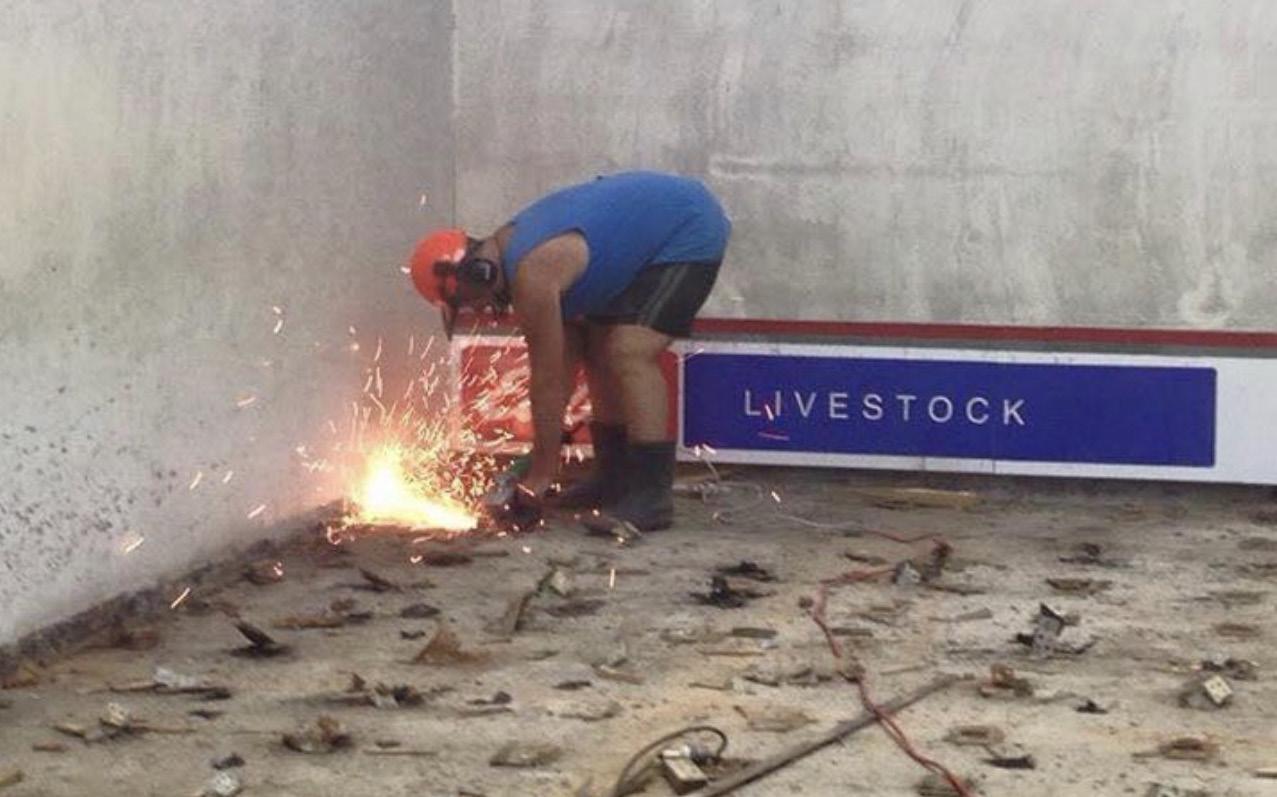

If you are looking for info on developing your facility, jump on our Facility Support page, we have Contractor Contacts, Special Offers and more to help clubs out.
Timaru Squash club - Midlands district coach
How long have you been involved in squash, both as a player and a coach?
I started playing squash when I was around 9 years old. I was instantly hooked and decided to switch my allegiance from tennis to squash. I’ve been involved as a coach for almost 9/10 years now. Initially helping out with schools and junior programs. But then became a full time coach 2 years ago after receiving an offer to coach in Sydney.
What motivated you to start coaching?
Initially it was to assist with coaching where I was originally based. And it also helped having qualifications on my CV.
I think there was a shift in motivation in coaching after receiving an offer in Sydney. It was something I always enjoyed doing, and to do it as a full time job… I couldn’t say no.
How would you describe your coaching philosophy?
I think for me it comes down to enjoyment. The player themselves have ultimately got to enjoy playing the sport. I’ve been playing for 18 years now and I’m still addicted. If players can find the same enjoyment as I do after all these years then that’s half the job done.
On court. The fundamentals are crucial. Once a player can get a solid base its up to them to discover there
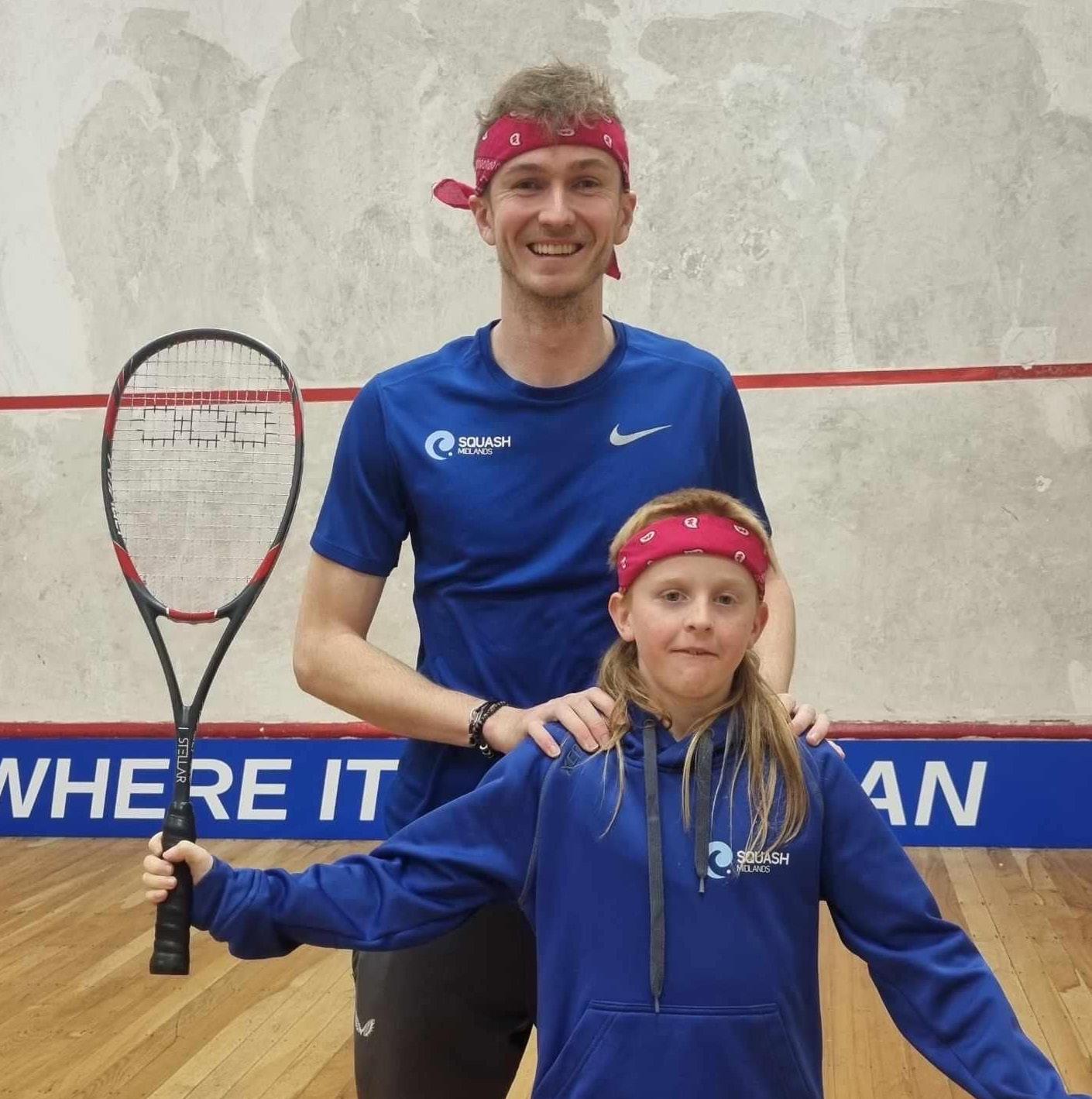
playstyle. Play the way they want to play, and as the coach I’ll be there to facilitate that.
What are some of the most rewarding experiences you’ve had as a coach? and what do you enjoy most about coaching?
Coming to New Zealand and coaching full time here has been an incredibly rewarding experience so far in general.
Taking some of the juniors to the New Zealand junior open is where it felt like everything came full circle really. After growing up through the junior system, attending European competitions where my coach would take a group himself. Normally it was me running around the squash courts, playing 3/4 court whenever a court was free. But now the student has become the master (maybe not so much a master but we’re getting there)
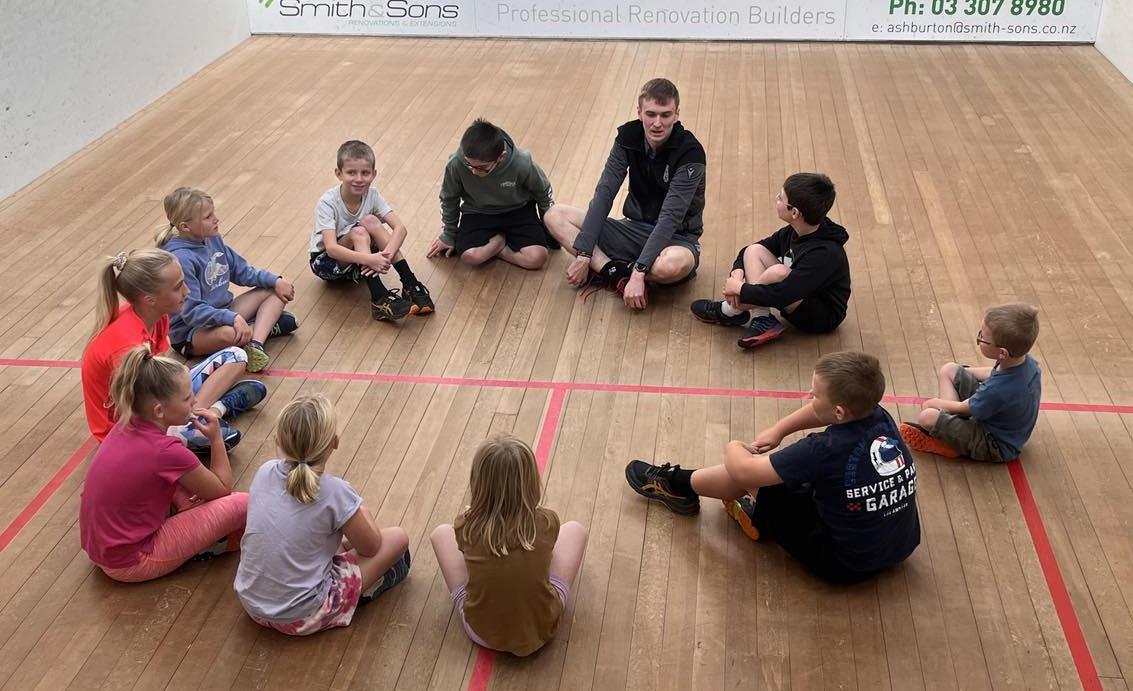
What advice would you give to aspiring coaches?
As I said before. It comes down to enjoyment. I’m still playing and coaching not because I have to, but because I enjoy it. For any young coaches especially. Get stuck in, get involved. Put yourself in uncomfortable positions. This is where you’ll grow not only as a coach but as a person.
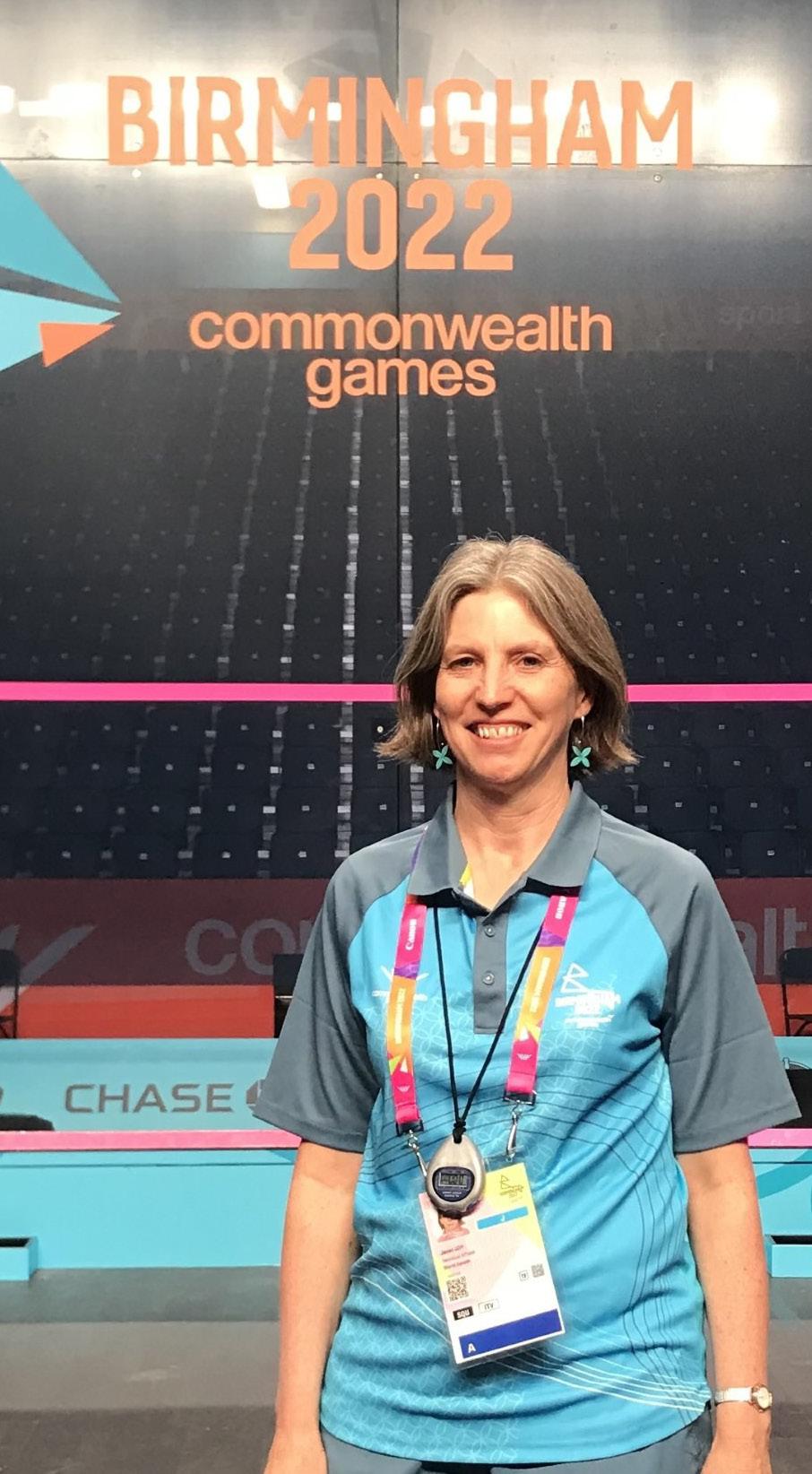
Club/District Affiliation:
Marlborough Squash Rackets Club in Blenheim
Referee Certification:
World Squash Officiating (WSO) Level 3
Referee Experience:
How long have you been refereeing? 18 years so far — I started refereeing in 2006 at local tournaments and then travelled to Wellington to get assessed as a District referee. The following year I travelled to Christchurch and Auckland to referee at tournaments and received my National referee accreditation at NZ National Championships that year.
What do you believe are the most important qualities for a referee to possess?
The referee can have a big impact on matcheswhile It is very important for a referee to have a good understanding of the rules and to keep current with how those rules are being applied. Good communicate and the ability to remain calm under pressure are necessary skills along with making sure the game is played safely and fairly.
Any memorable experience as a referee you wish to share?
One memory that stands out was my first match as centre referee at the Women’s World Teams event in Egypt — the whole crowd turned around and looked at me as I did the match introduction — initially I thought I’d said something wrong but it was just because they didn’t recognise my voice so were looking to see who the referee was. The Egyptians are very passion about their squash — the kids even asked us referees for our autographs!
But overall what I’ve enjoyed most about refereeing has been the opportunity to meet people from all over the world and experience the different cultures that play squash.
What advice would you give to someone who is interested in becoming a squash referee?
The first piece of advice I give to anyone interested in refereeing is to read the rules and to make sure they’ve got a thorough understanding of them.
Secondly, being a very good marker is an important skill to learn. At major tournaments, referees often do the job of both refereeing and marking so it is very important to be able to make all the correct announcements without even thinking about it.
I think it is important that someone starting out knows that becoming a qualified refereeing is a big commitment generally requiring lots of travelling to tournaments and refereeing many, many matches. But it is definitely worthwhile if you are prepared to make the commitment.
How do you plan to continue improving your skills and knowledge as a referee?
Doing what I am doing now — refereeing at as many tournaments as I can, getting feedback on my refereeing, reflecting on how I can improve my skills and watching lots of Squash TV.
If a player is serving, swings at the ball and misses it completely, is that a fault?
AYes. The server must drop or throw the ball from a hand or racquet and strike it correctly on a first or further attempt before it touches anything else. A swing on the serve would include forward motion of the racquet towards the ball.
Rule 5.7.1
Do you have a refereeing question or a situation you are not sure about?
Chances are others may have the same query. Send your query to our NZ Referees c/mikejack@xtra.co.nz and we will share the answers with the squash community each month.
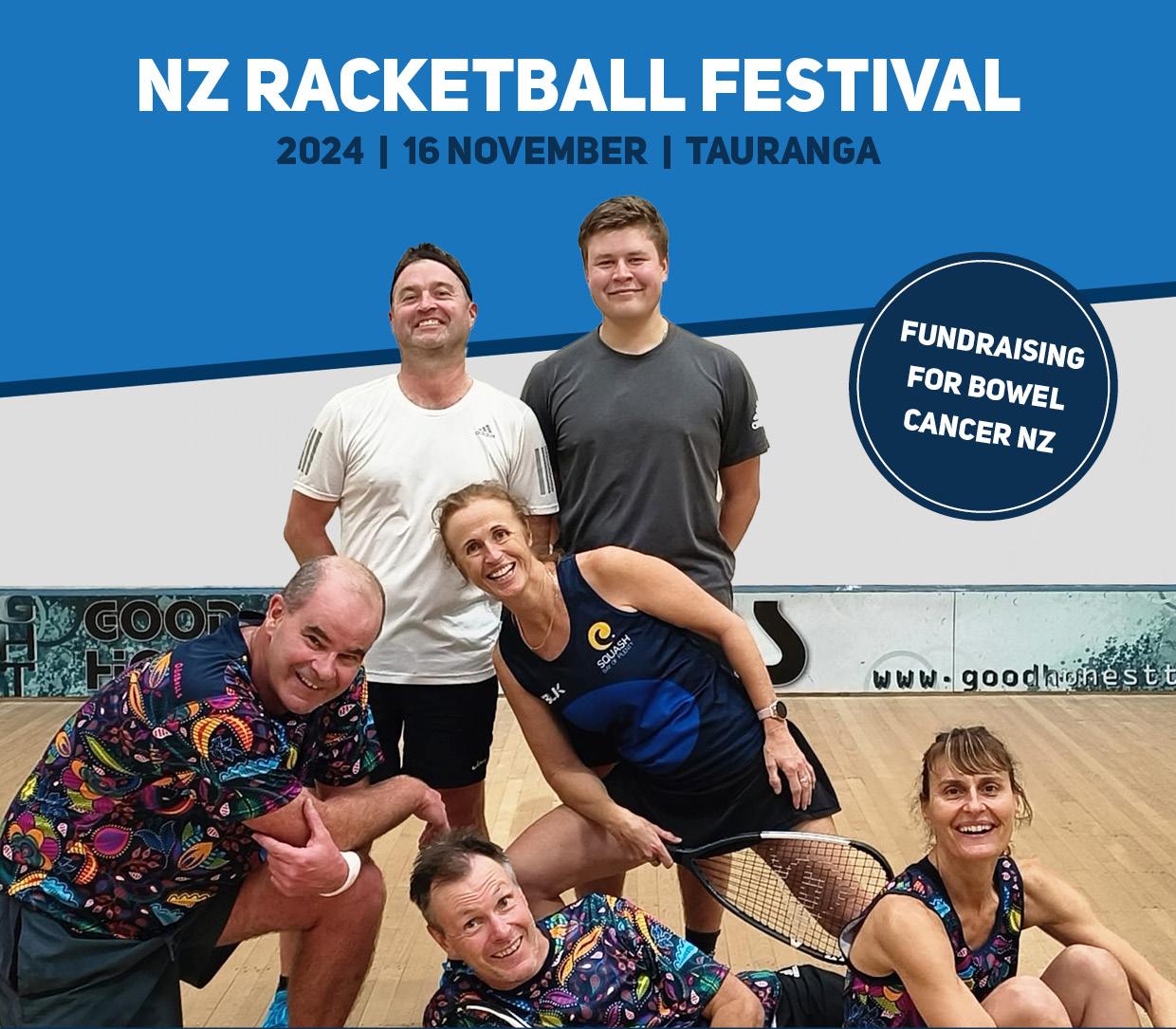
The annual NZ Racketball Festival has a new date, and will now be held on Saturday 16 November at the Devoy Squash & Fitness Centre in Tauranga. The Festival was first played in 2022, with a focus on fun for experienced and first-time Racketball players.
This year’s event will raise funds for Bowel Cancer NZ, a nationwide charity dedicated to patient support, advocacy, vital research, and reducing the impact of bowel cancer. Bowel cancer is the second highest cause of cancer death in NZ, with 1,200 dying of the disease every year.
Please note – every situation is different and without seeing the exact context (player skill, direction of movement etc) we are giving our responses based on the rules and some guidance on how to apply them.
Enter as an individual and be placed into a suitable team of 3, or enter your own full team.
Event details
• Includes open and beginners social divisions
• Dunlop Competition (Blue) ball used
• 3 matches per team and player on the day
• All matches best of 3 PAR11 - beginner social division PAR15
• Open to players of all level - no previous Racketball experience necessary!
• Team Composition - Mixed teams of 3 - Each team must have one male/female player - Max of one A-Grade male squash player per team
• Entry fee - $30 per person ($90 per team) includes dinner and spot prizes with $10 from each entry donated to Bowel Cancer NZ.
Entries via iSquash and enquiries to john@squashnz.co.nz.
Format:
Runs twice a year (pre- and post-Xmas).
Free entry; open to all skill levels.
Participants are ranked and placed into balanced teams. Families are kept together when possible.
10 teams total of 5 players each plus a pool of 10 reserve. 6 teams play weekly, with 4 teams on a bye. Competition lasts 10 weeks, including semis and finals.
If a suitable replacement can’t be found among reserves, then use players from the teams on a bye.
Matches run from 6-8pm with continuous scoring (20 minutes per match). No warm-up; players start immediately. No strokes; everything is a let.
Each team has two ‘super powers’ to use each night, for example, play with an old racket and each point won is worth three points or when the opposing team cannot score any points for 5 mins. Adds a fun twist to the game, enhancing social interaction. These could also be used to even up contests – if the top team was playing the bottom team, the bottom team might get four Super Powers to play and the higher team none.
Includes other fun rules such as lose two points for hitting tin, lose 10 points for serving out.
Participants:
Club members only.
60 registered players, 10 teams of 6 people with 5 playing. Only 6 teams competing each week using three courts.
Promotion:
Word of mouth among members; new members encouraged to join.
Social and fun atmosphere. Keeps families together and engaged.
Starting early and the consistent times each week important for families.
Easy registration and participation.
Appeals to new members as an added club benefit. Takes away some of the challenges they were finding with Business House as you don’t have to find your own team, and matches are a lot more even.
Having bye teams makes finding replacement players much easier.
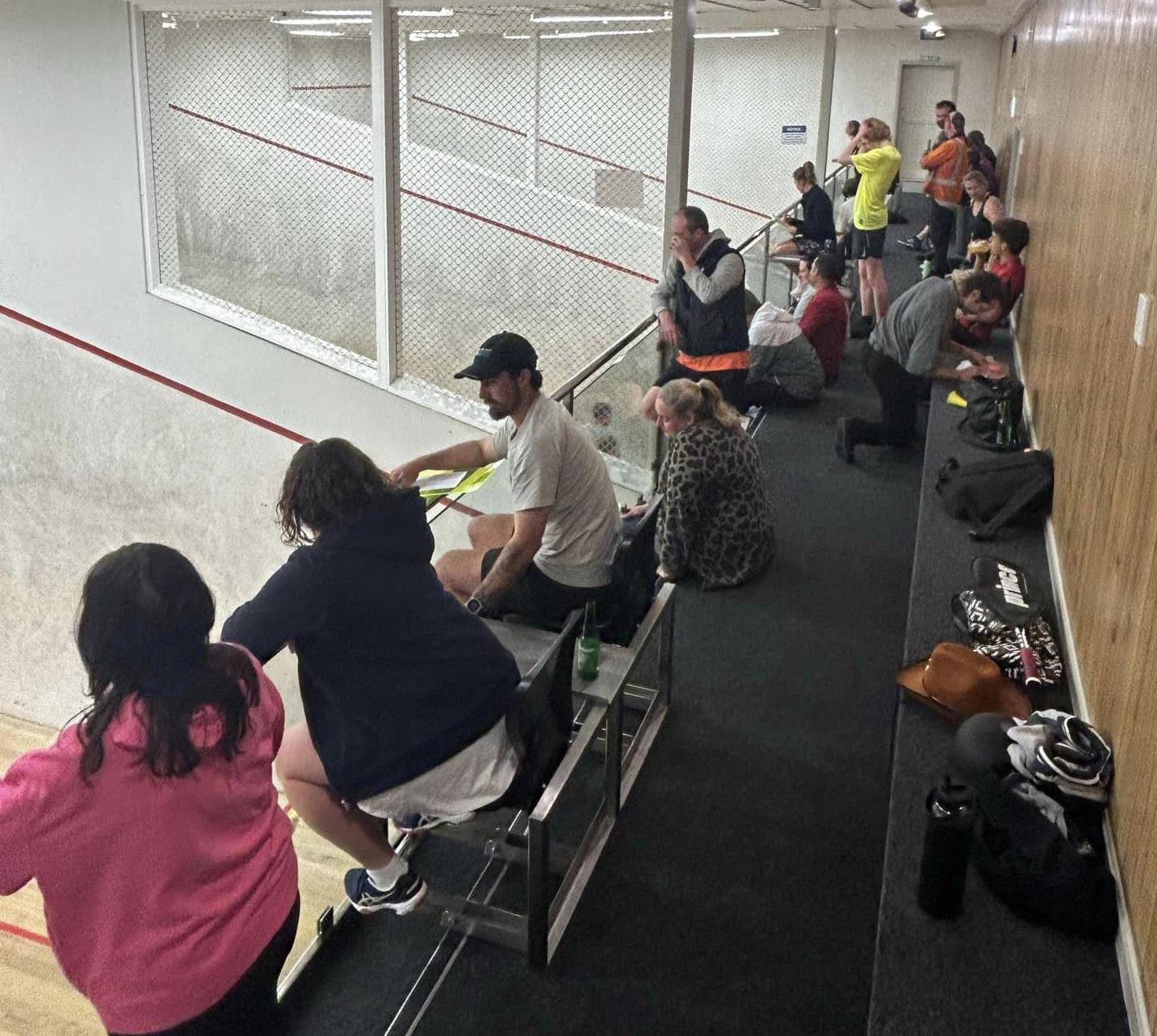
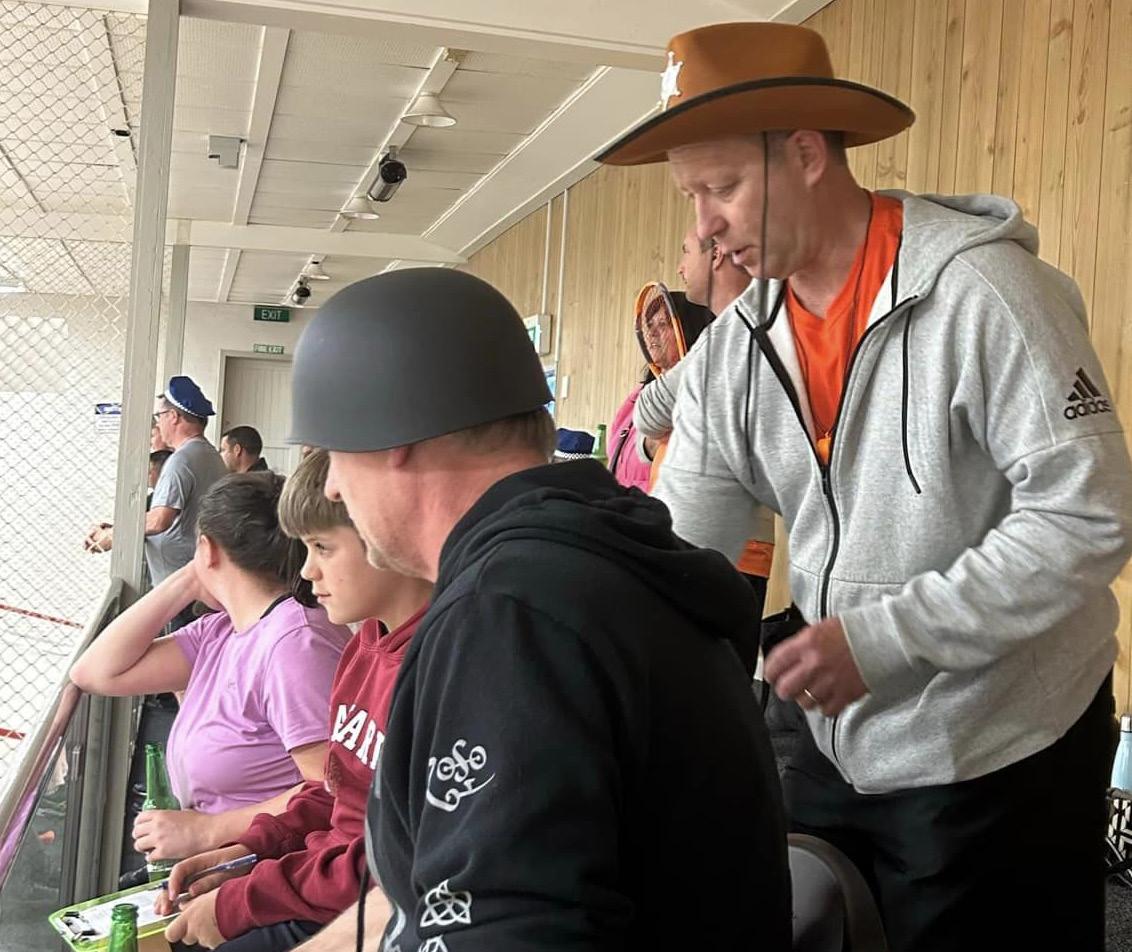
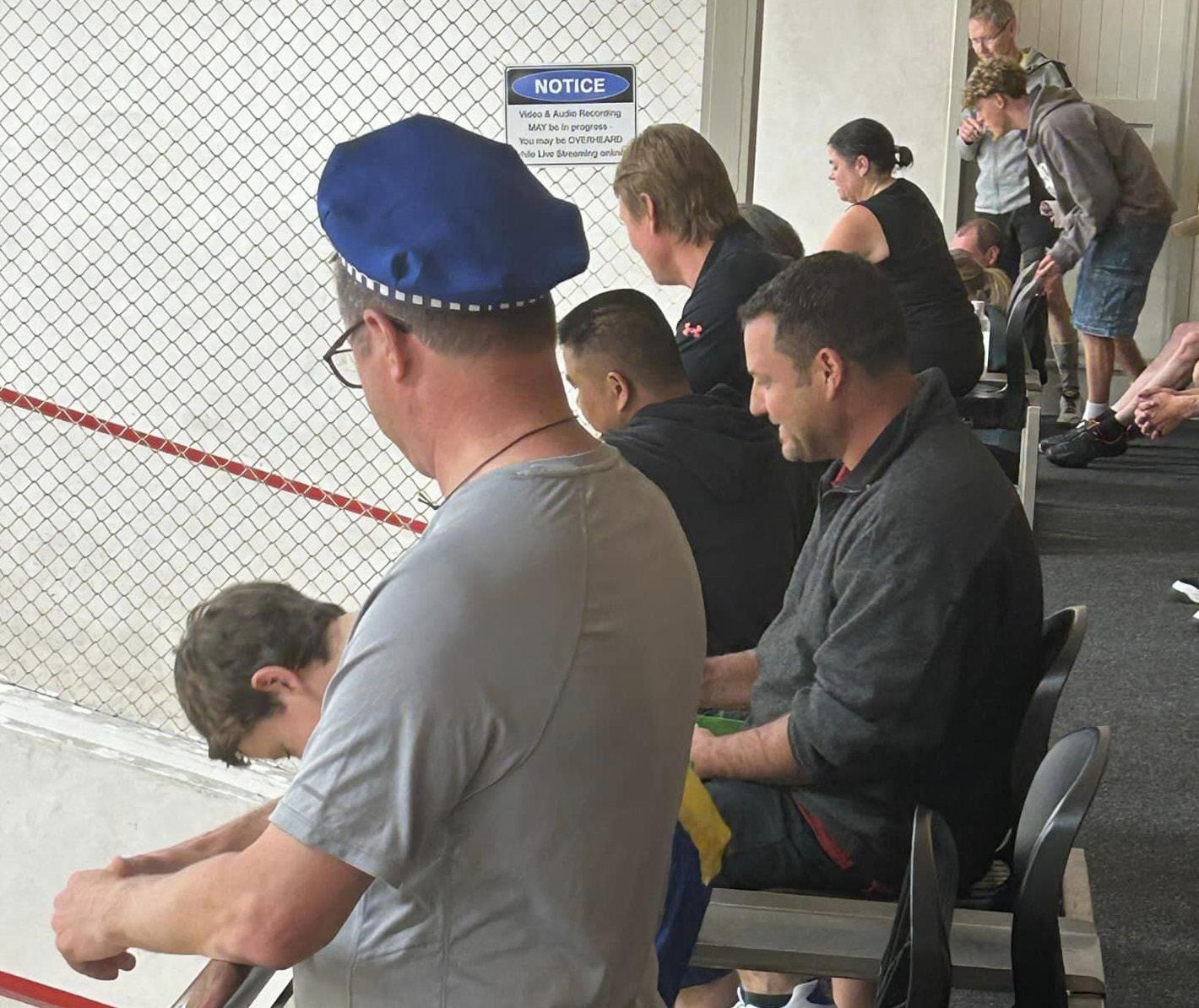
Squash Waikato hosted the first-ever 13 and Under Festival of Squash at Cambridge and Leamington Squash Club, and it was an overwhelming success!
This exciting event, conceived by Emma Millar, Squash Waikato’s Development Officer, brought together 39 young players from Waikato, Bay of Plenty, Auckland, and Eastern regions for an actionpacked weekend.
The festival featured a diverse range of activities, including fun games, skill-building sessions, coaching clinics, conditioned games, and match play. Emma Millar, with collaborative efforts from Robbie Wyatt of Squash BOP and Manu Yam of Squash Auckland, ensured the event was exceptional. Robbie Wyatt aptly remarked, “This is what grassroots delivery is all about—lots of fun engaging activities. We need to do this again.” Jason Fletcher from Squash NZ echoed this sentiment, suggesting it would be fantastic if similar events could take place across the country.
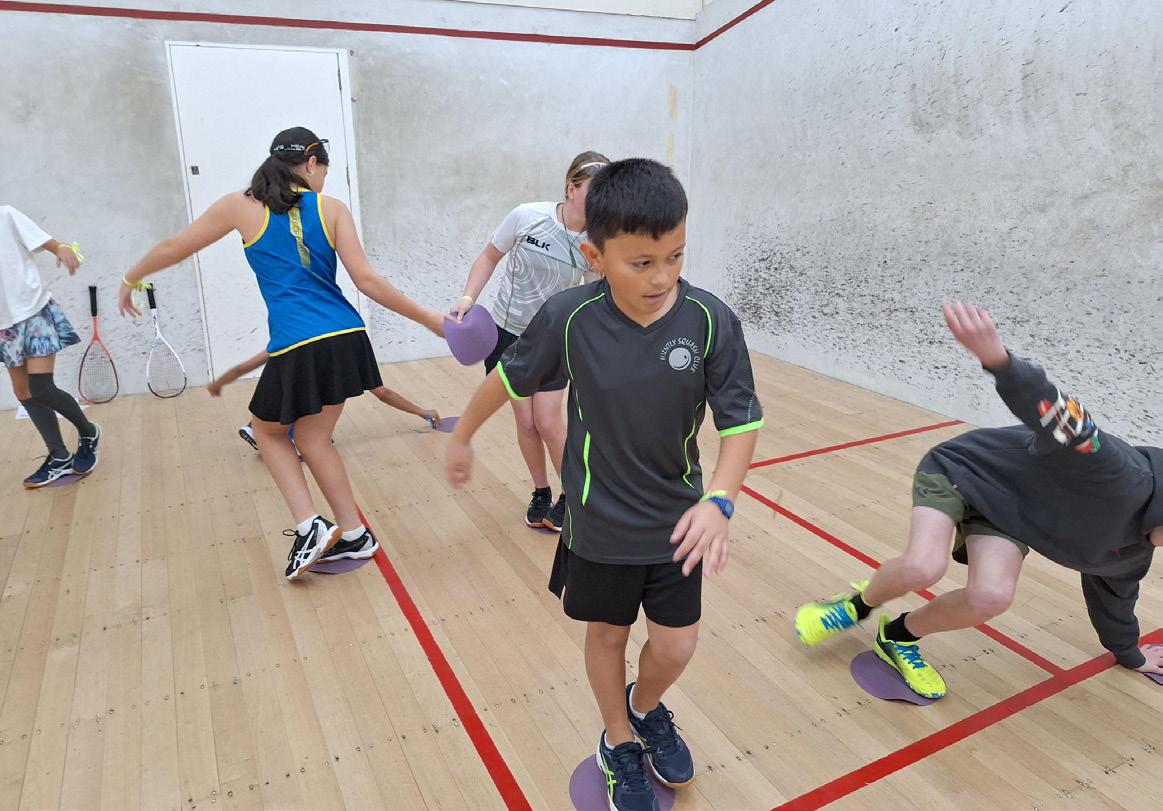
“My favourite thing about the weekend was making new best friends.”
“I liked playing lots of new games with different people.”
Fourteen dedicated coaches from across the three regions, and many of whom are part of the Squash Waikato Youth Coach Development Programme, worked with players aged 6 to 13. They created an engaging and educational environment, ensuring everyone had fun while enhancing their skills. Their enthusiasm and expertise were crucial to making the event memorable.
Emma also extended her thanks to the parents, coaches, and volunteers whose support and commitment were instrumental in the event’s success. Their contributions ensured a smooth and enjoyable experience for all involved.
The feedback from participants was overwhelmingly positive, with several players and parents sharing their highlights:
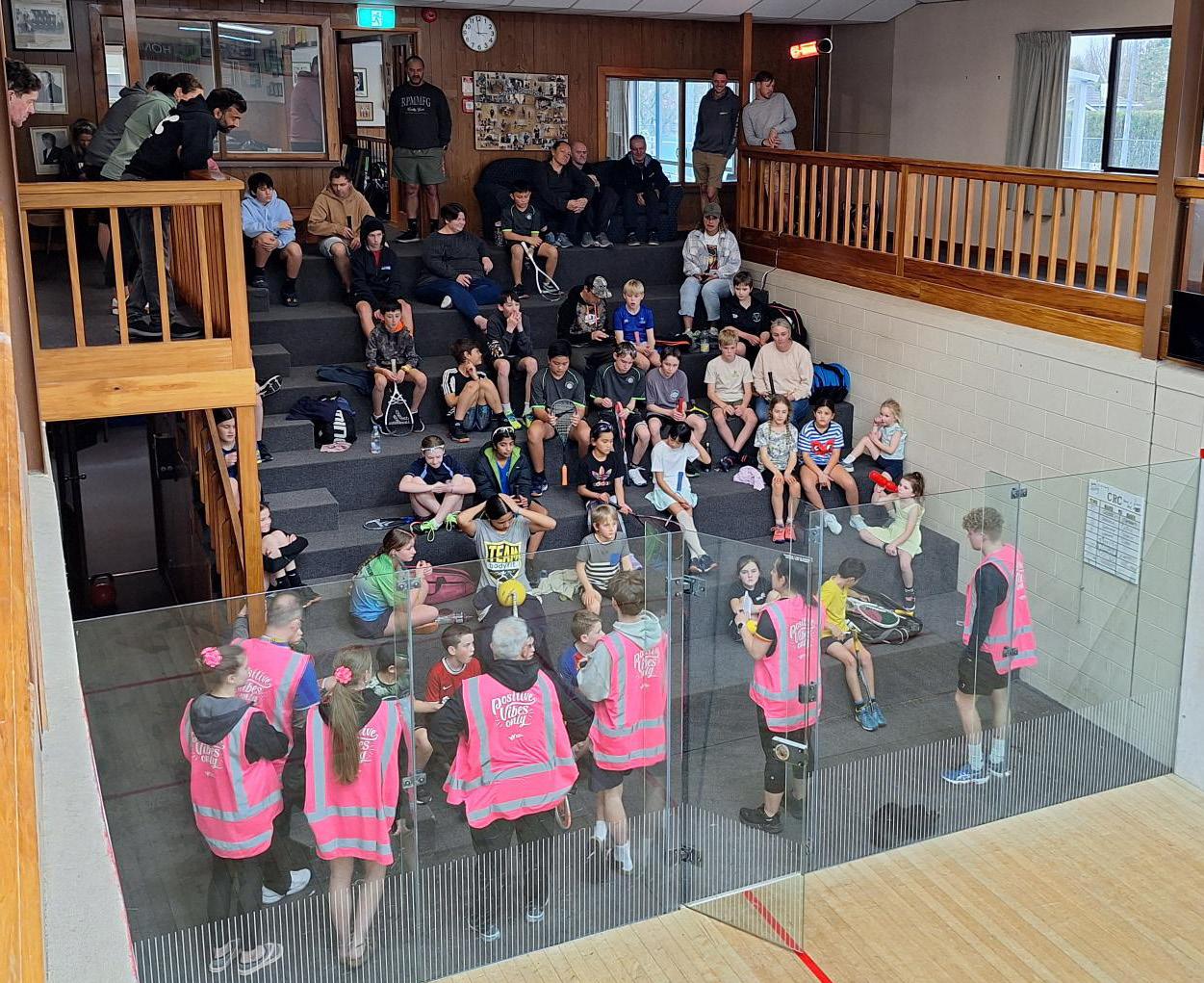
“I really enjoyed playing with new people from other places who are my age.”
“Hey Dad, when we get home can we go down to squash?”
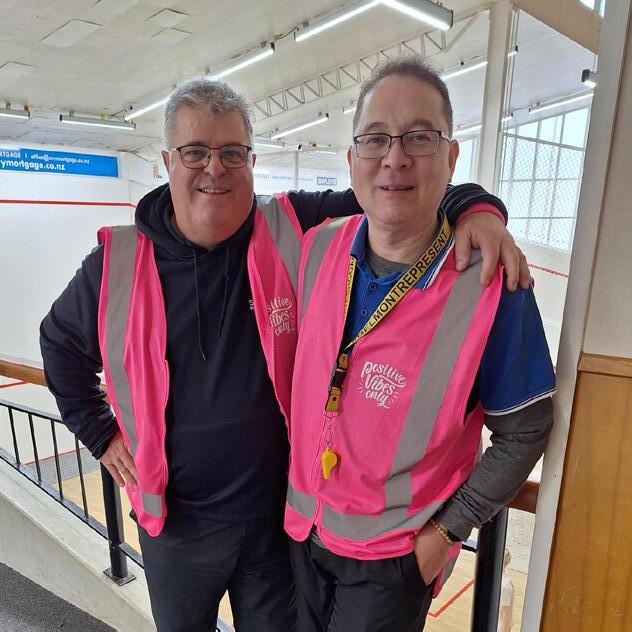
“The weekend has been awesome. My child isn’t usually one who gets too involved or excited about squash, but after yesterday, they couldn’t stop talking about all the things they want to do in squash and the things they are going to teach their coach to do at junior night.”
Emma was deeply grateful to Cambridge and Leamington Squash Clubs for hosting the event, as well as to Squash BOP and Squash Auckland for their invaluable collaboration in making this fantastic opportunity possible.
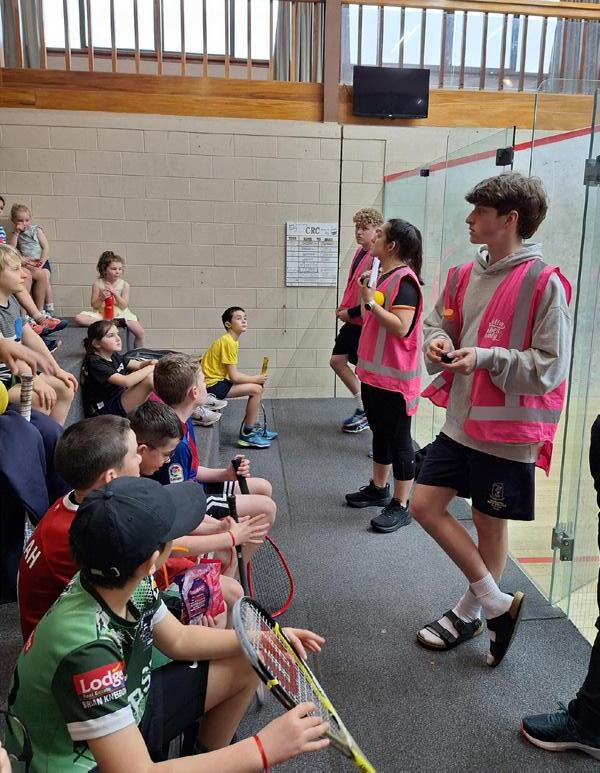
Keep an eye on Squash Waikato’s social media for more highlights from the weekend, including videos and participant feedback. The inaugural 13 and Under Festival of Squash has set a high standard and promises to become a cherished annual event for young squashies.
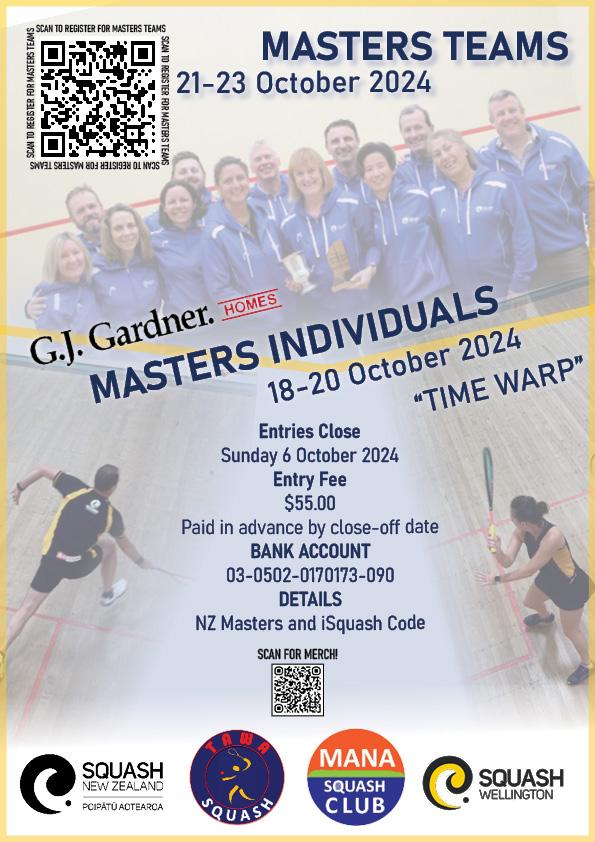
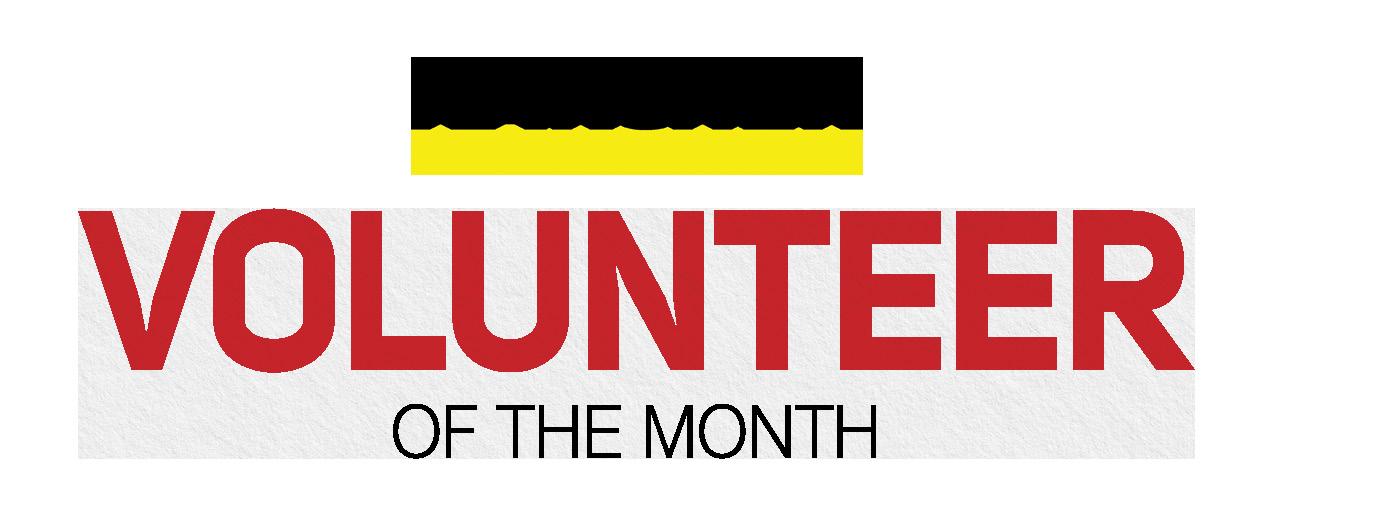
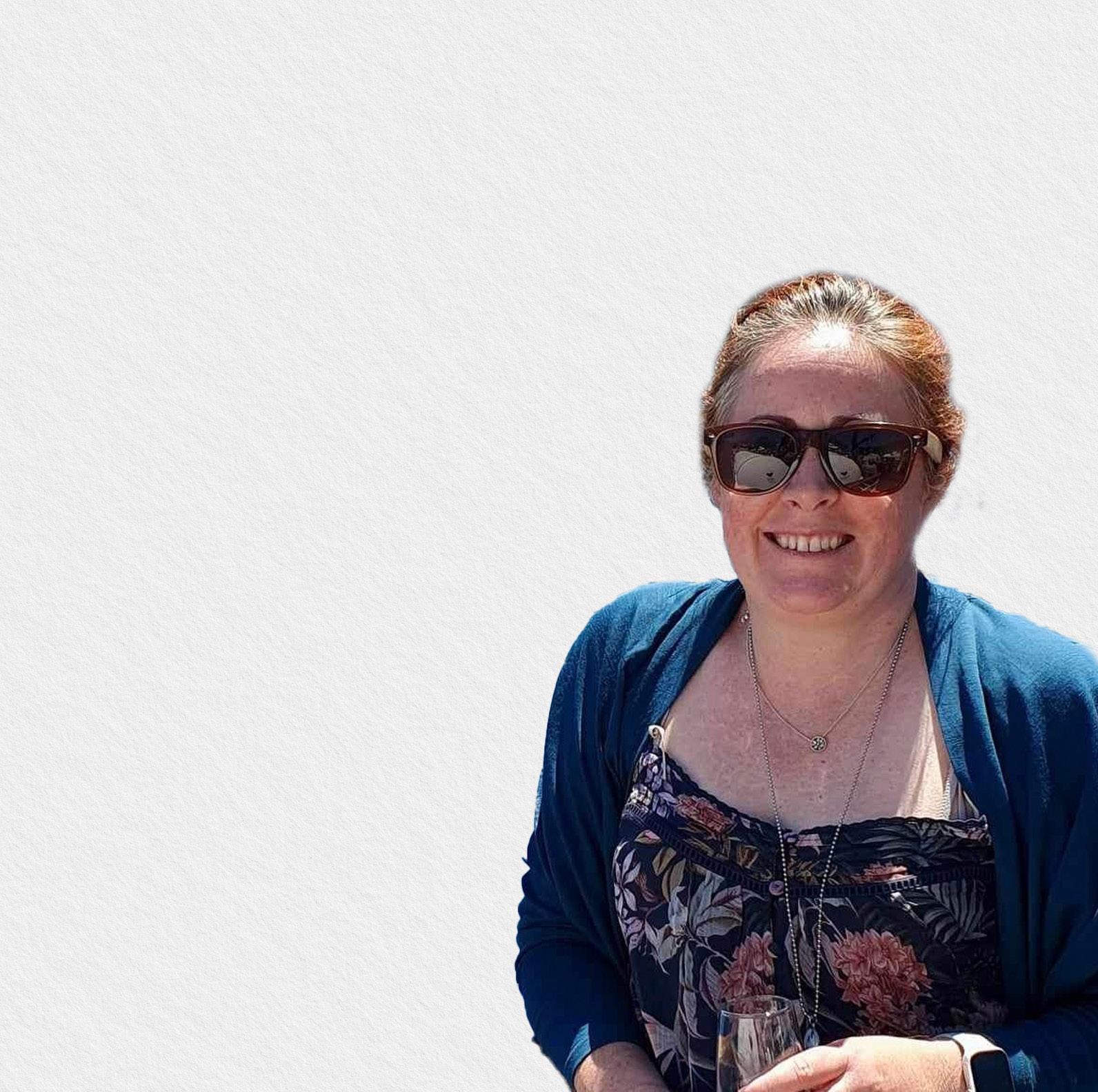
In this September issue of The Boast magazine, Squash Bay of Plenty proudly recognises Kelly Cox as Volunteer of the Month. Serving as a dedicated board member for the past five years, with four of those years as chairperson, Kelly has consistently gone above and beyond in what is often a thankless role. In addition to general board member responsibilities, she leads the group of board members, represents the Bay at Squash New Zealand level, is constantly signing documents and provides essential support to staff, always at the other end of the phone.
A longtime member of Mount Maunganui Squash Club, she continues to volunteer there as well, balancing these commitments with her responsibilities at Squash Bay of Plenty. Kelly also still finds time to play regularly and support clubs across the Bay of Plenty. Through her leadership as chairperson, she has been instrumental in guiding the organisation toward a future-focused direction, helping to establish the strong position that Squash Bay of Plenty enjoys today. Kelly’s dedication has been invaluable, and her contributions deserve to be celebrated. Thank You Kelly!
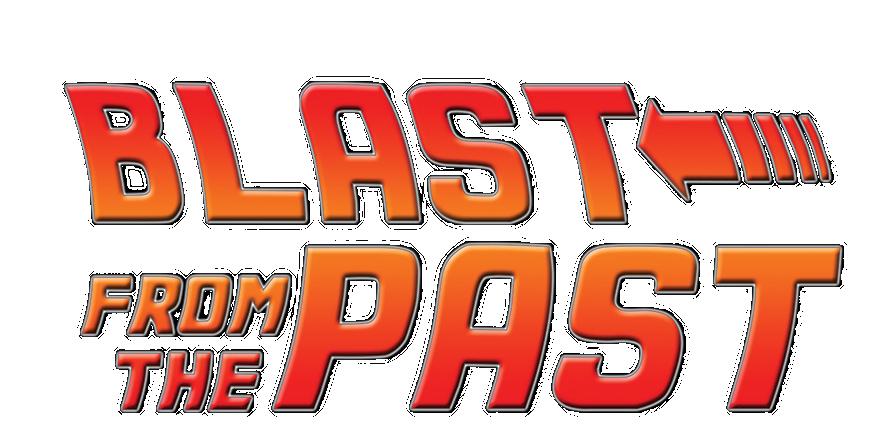
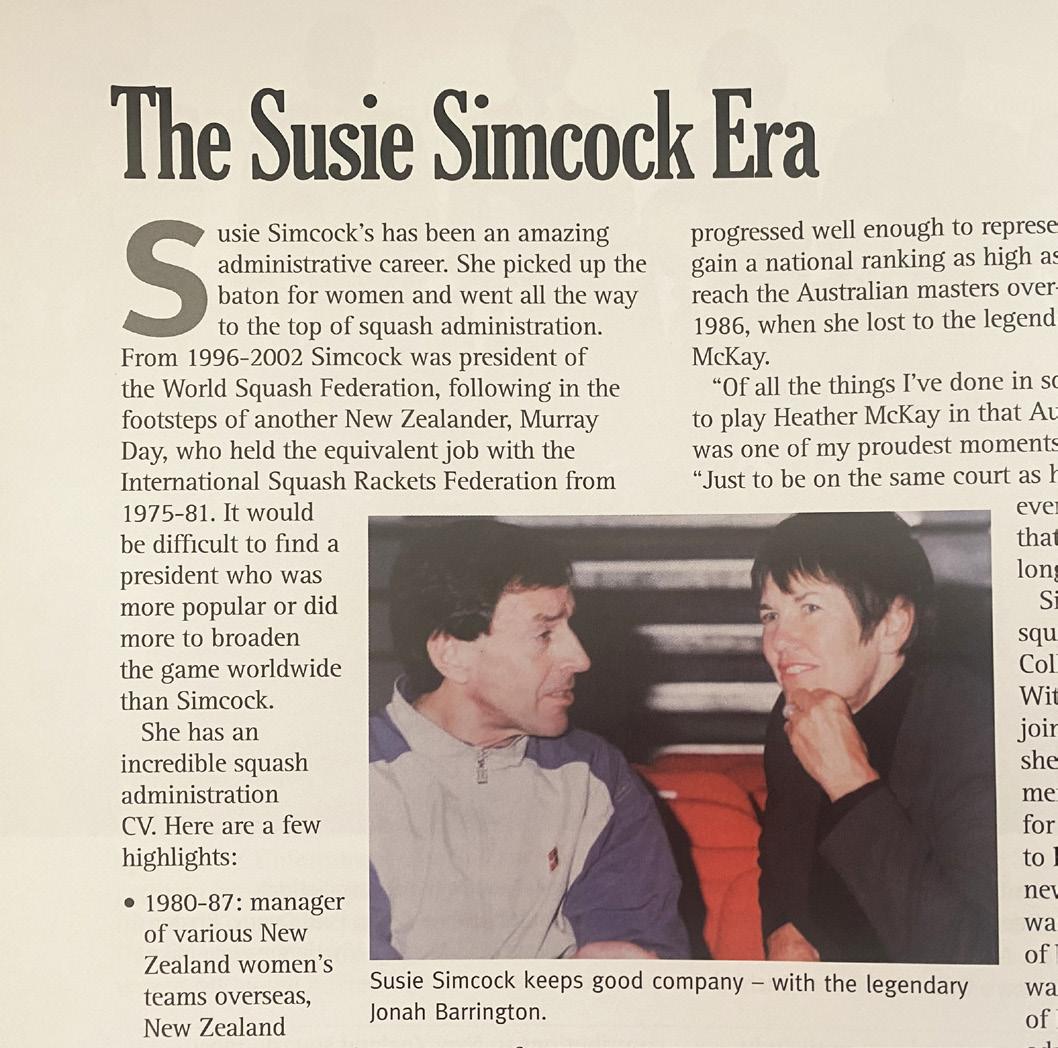
Susie Simcock was a pioneering figure in promoting female participation in squash. Her leadership roles, including serving as the President of the World Squash Federation (WSF) from 1996 to 2002, were pivotal in advocating for greater opportunities and visibility for women in the sport.
During her tenure, Simcock initiated and supported numerous programs aimed at increasing female participation. These initiatives included creating more competitive opportunities for women, such as tournaments and leagues, and encouraging the development of junior and grassroots programs specifically targeting young girls.
Simcock was a driving force behind the campaign to have squash included in the Olympic Games. She worked tirelessly to promote the sport’s case to the International Olympic Committee (IOC), highlighting its global appeal, the athleticism of its players, and the sport’s values of inclusivity and fairness. Susie Her efforts laid a strong foundation for ongoing campaigns. Her work raised significant awareness and support for the cause, and her legacy continues to inspire those advocating for the sport’s inclusion, which will finally happen at the 2028 LA Olympics
Click HERE to purchase Long or Short by Joseph


Q1 - What happens to my Level if my opponent got injured during our match?
Answer - for a match to be submitted for grading and have level changes calculated, one or more full games need to have been completed with the uninjured player winning at least one of those games.
Matches that have not started or where at least one full game has not been completed cannot be submitted for grading by SquashLevels.
This is because the system relies on full game scores and every point to be accurate. However, we are making allowances to reward a player who was on the way to winning, while removing a disincentive for players to pull out of a match they are losing to avoid a Level decrease.
This scenario applies where the injury was self-inflicted or contributed, where under the official rules of squash the uninjured player is awarded the match. In scenarios where the injury was opponent-inflicted and the injured player is awarded the match, the reverse applies in that the injured player needs to have won at least one game for Levels to count.
Read the full default guidelines HERE
Read the full WSF rules of squash HERE
Q2 - How long does it take results to get into MySquash?
Answer - there are three steps from your match being played to the results showing up in MySquash.
1. Matches are entered into iSquash and submitted to the grading list – done as soon your team captain or tournament controller completes this.
2. Matches entered by 1pm each day are collected from iSquash by SquashLevels and processed in their system around 3pm. Matches entered after 1pm will be picked up 1pm the following day.
3. MySquash collects new match results and updates the level for all players from SquashLevels at 3am each morning.
For example – if you have interclub results entered on a Tuesday night following your match, these will show in MySquash on Thursday morning.
Q3 - Why did my Level go up more against one player than another, when I was on the same Level as both?
Answer - while the SquashLevels system is far more dynamic than our previous grading system, there are still some checks in place to ensure players don’t bounce up or down too much after very good or very bad tournament. Also, remember that every point in a match counts so winning matches in 4 could still have very different total point counts which mean different level changes.
In general, a player’s level won’t go up by more than 10% or down by more than 5% if they’ve played in the last 7 days. These are relaxed if their previous match was further back.
Try look at your level as a trend over a period time rather than match-by-match. If you had a big win against a player in your first round of a tournament and increased 7.5%, you may find another win against a similar level player will see less of an increase. However your overall increase from the tournament will still be impressive!
This also works the opposite to avoid players having their level decimated by having an off-weekend, which we’ve all had!
View all our FAQ’s on the new grading system HERE
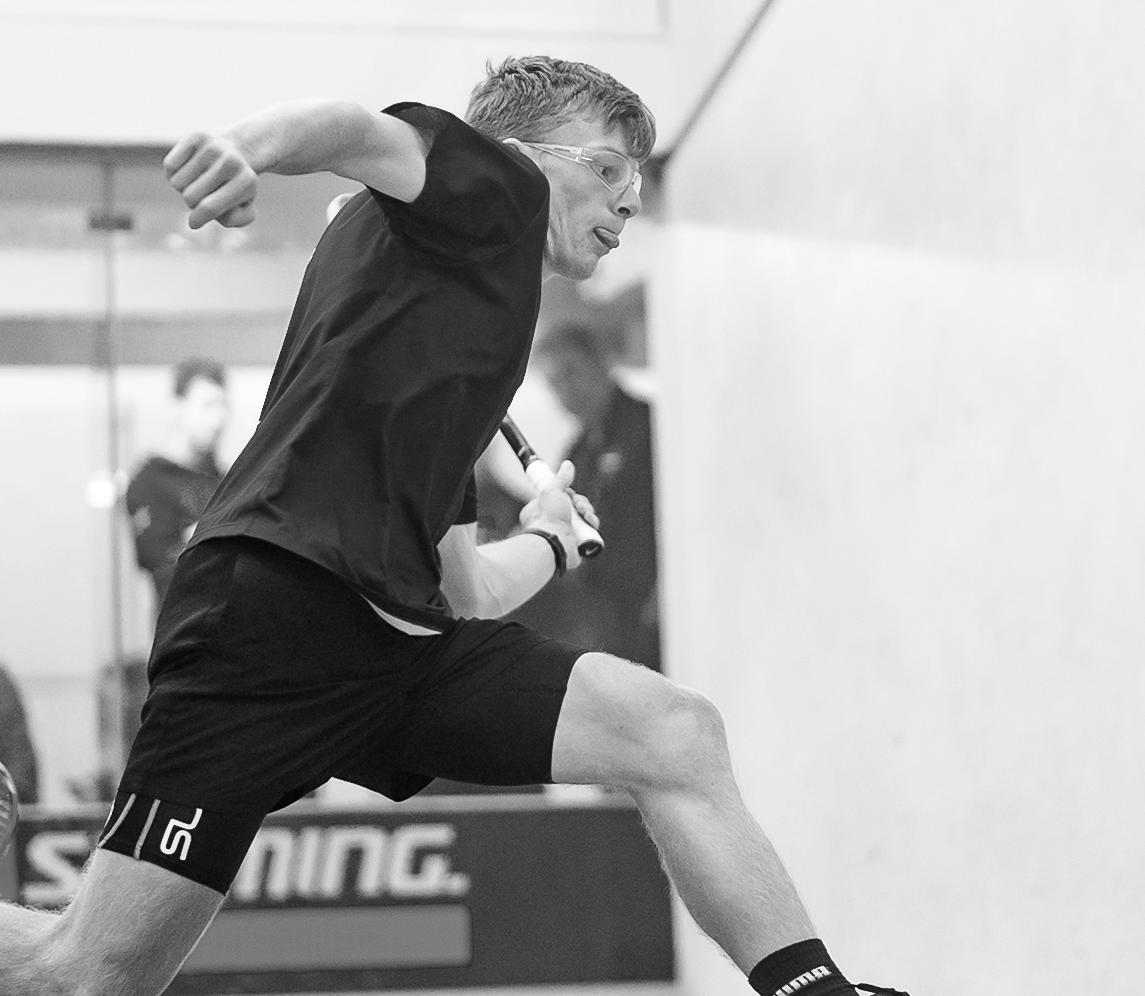
and get 90 days free Gold trial, plus 25% off an annual subscription for affiliated club memberswww.squashlevels.com/membership
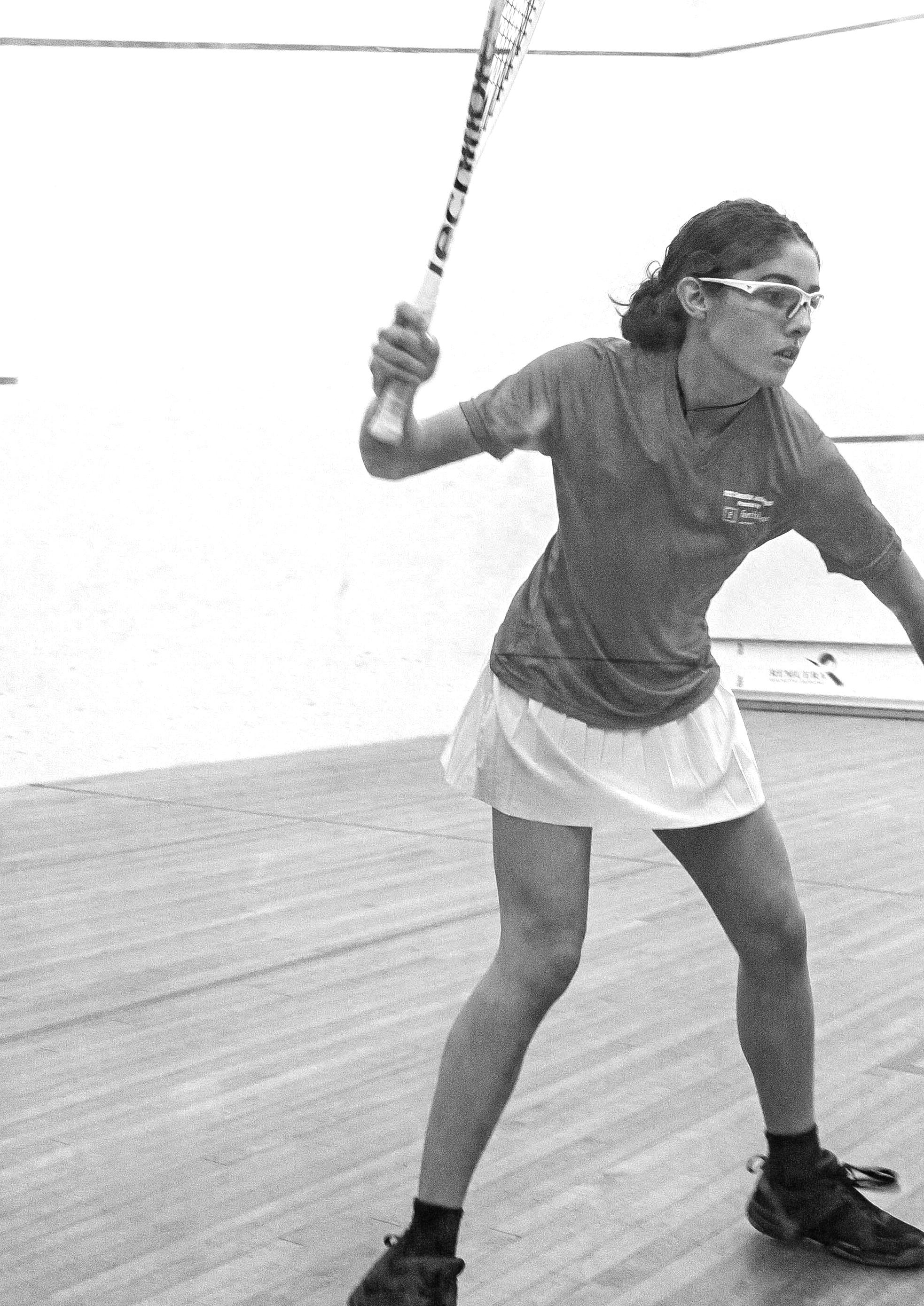
MOST IMPROVED FEMALE
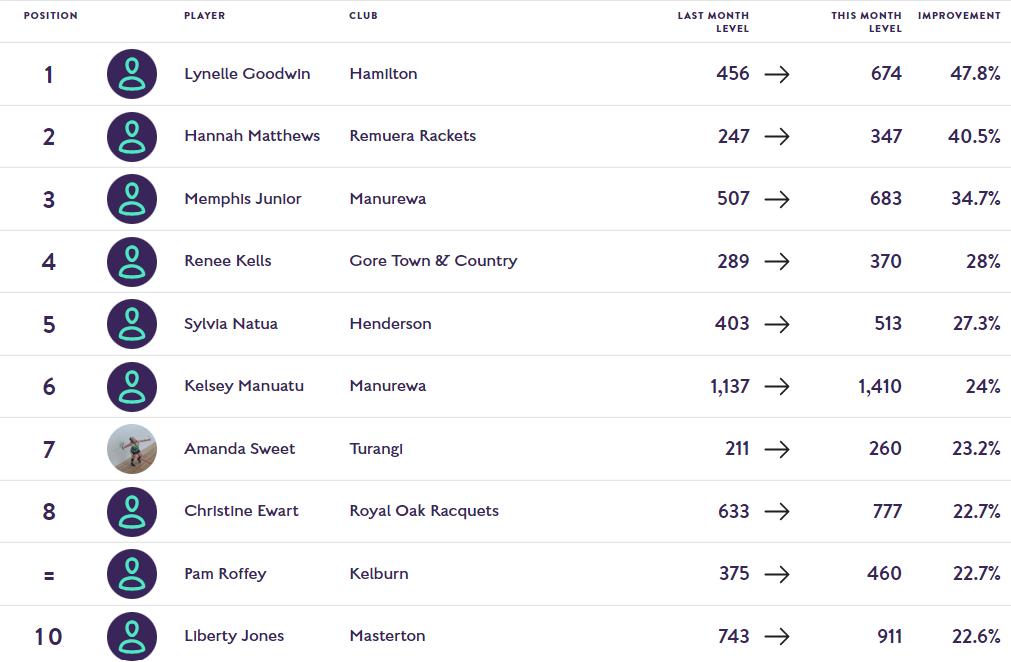
LYNELLE GOODWIN / Hamilton
MOST IMPROVED MALE congratulations congratulations
47.8%
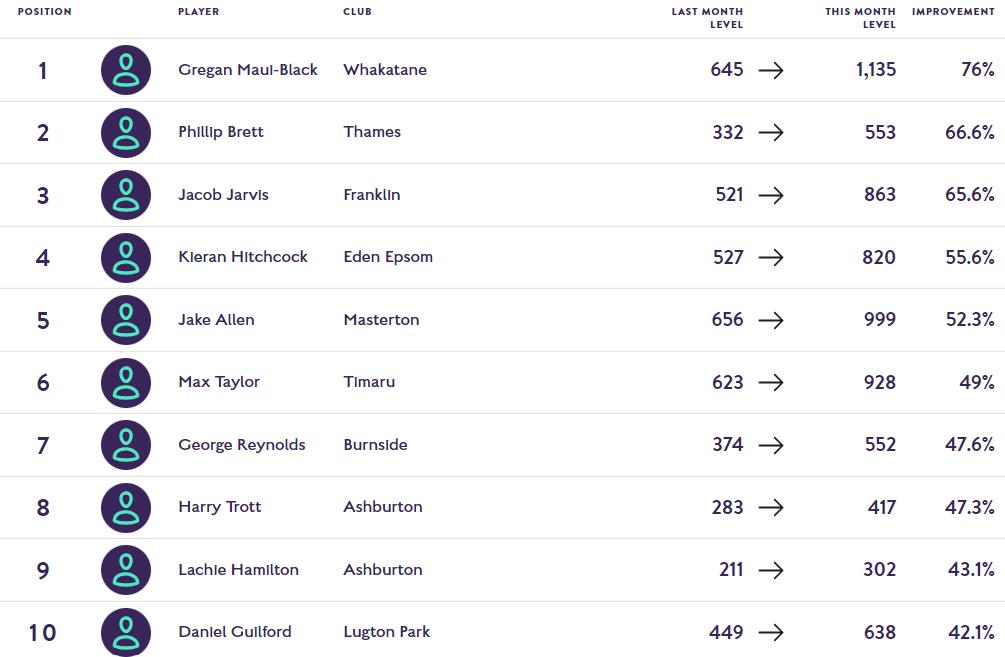
GREGAN MAUL-BLACK / Whakatane
76%

The world’s best squash players are coming to Ōtautahi Christchurch for the 2025 New Zealand Squash Open from 4th to 9th March at the iconic Isaac Theatre Royal!
Experience the thrill of top-tier squash in this stunning venue offering spectacular views for all fans. With ticket prices starting at just $20, depending on the day and category, this is an event you won’t want to miss!
Whether you’re a local or travelling to Christchurch, come witness history in the making and be part of this incredible sporting event. Let’s fill the theatre with passionate fans and show the world what Ōtautahi is all about!
TICKETS VIA TICKETEK - CLICK HERE TO BUY YOUR TICKETS

16th - 18th
1st - 3rd
26th - 28th
16th -19th
24th - 26th
31st - 2nd
7th - 9th
21st - 23rd
19th - 23rd
28th - 30th
5th - 7th
12th - 14th
19th - 21st
2nd - 4th
9th - 11th
17th
31st - 1st
18th - 21st
18th - 21st
18th - 21st
18th - 21st
18th - 21st
4th - 6th
7th - 8th
18th - 20th
21st - 22nd
Event
Rochelle Hobbs Memorial Henderson PSA Open
NZ Doubles Championships
NZ Junior Open
Auckland Open PSA Challenger
Oceania Closed PSA
Mitchell Cup & Cousins Shield
Morrinsville PSA Challenger
National Graded Championships
Skillzea PSA Open
Trident Homes South Island Open PSA Challenger
NZ Squash Championships
South Island Junior Age Groups
North Island Junior Age Groups
NZ Seconday Schools Squash Nationals
Masters Club Team Championships
NZ Racketball Festival
NZ Inter-District Team Championships
G.J. Gardner Homes National Superchamps
B Grade Superchamps
C Grade Superchamps
D Grade Superchamps
E Grade Superchamps
F/J Grade Superchamps
G.J. Gardner Homes NZ Junior Age Group Championships
NZ Inter-District Junior Team Championships
G.J. Gardner Homes NZ Masters Championships
NZ Inter-District Masters Team Championships
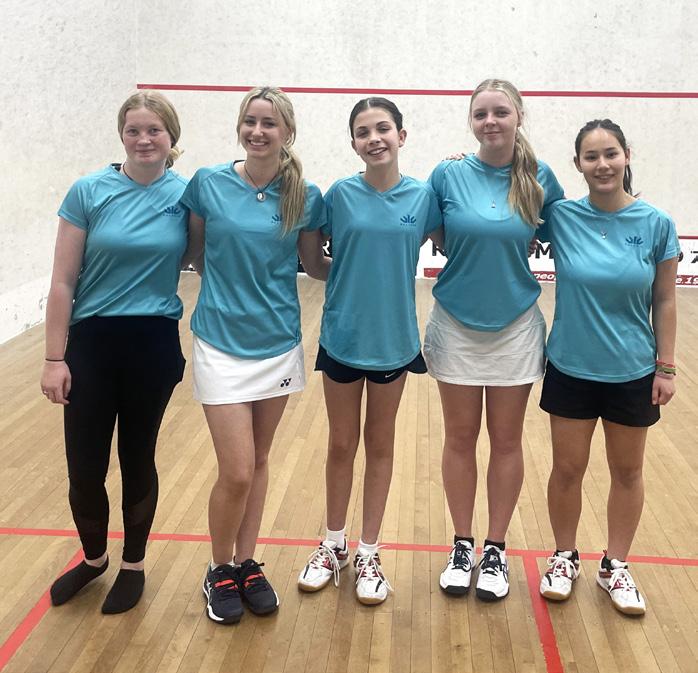
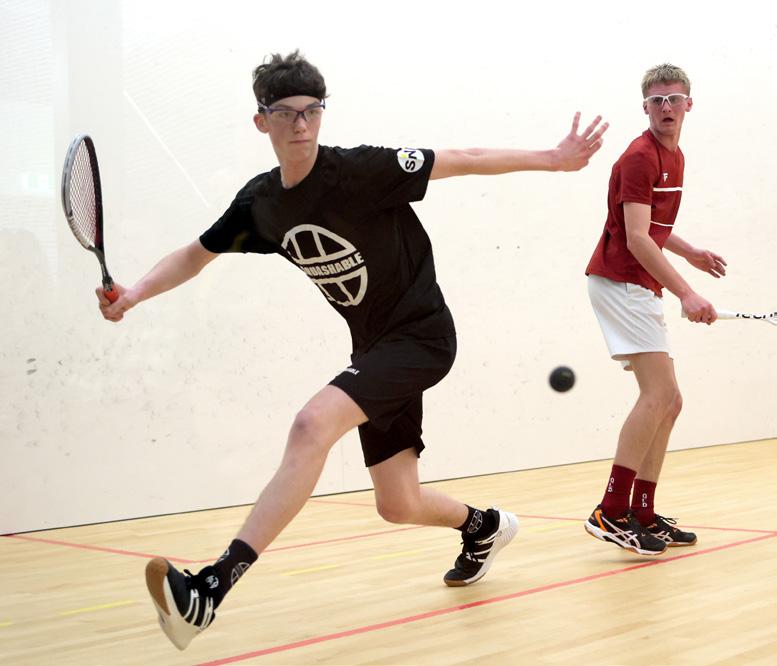
Southland
Auckland
Auckland
Wellington
Wellington
Club
Henderson Squash Club
Christchurch Squash Club
Squash Gym Palmerston North
North Shore Squash Club
Papakura Tennis & Squash Club
Hawkes Bay Squash Rackets Club
Morrinsville Squash Club
Henderson Squash Club
Pirates Squash Club
Richmond & Christchurch Football SC
Devoy Squash & Fitness Centre
Otago Squash Club
Taupō Squash Club
Hutt City Squash Club
Whanganui Squash Club
Devoy Squash & Fitness Centre
Otago Squash Club
Whangarei Squash Club
Hamilton Squash & Tennis Club
Methven Squash Club
Kawaroa Park Squash Club
Squash City Invercargill
North Shore Squash Club
North Shore Squash Club
Tawa & Manā Squash Clubs
Tawa & Manā Squash Clubs
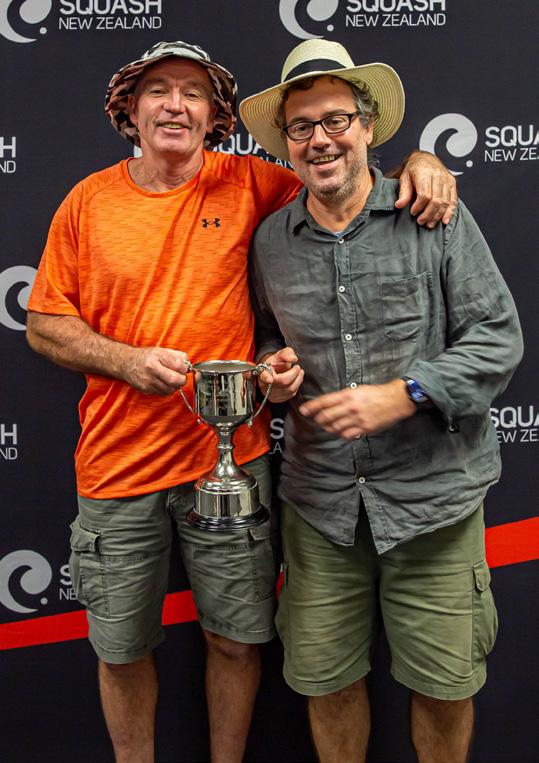

Want to be featured in The Boast?
Email brooke@squashnz.co.nz with stories from your club or district to be featured in the next edition of The Boast.
MAJOR PARTNER
PROGRAMME & TEAM PARTNERS

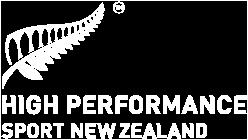
COMMUNITY TRUST SUPPORTERS
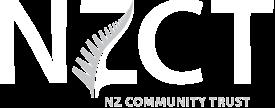
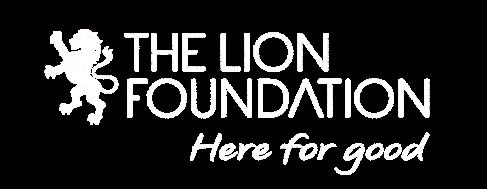
EQUIPMENT & SERVICE PARTNERS

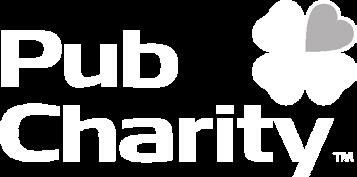
Subscribe to The Boast here